#historically accurate belle
Note
Do you think you can draw a historically accurate version of belle’s other dresses in beauty and the beast?
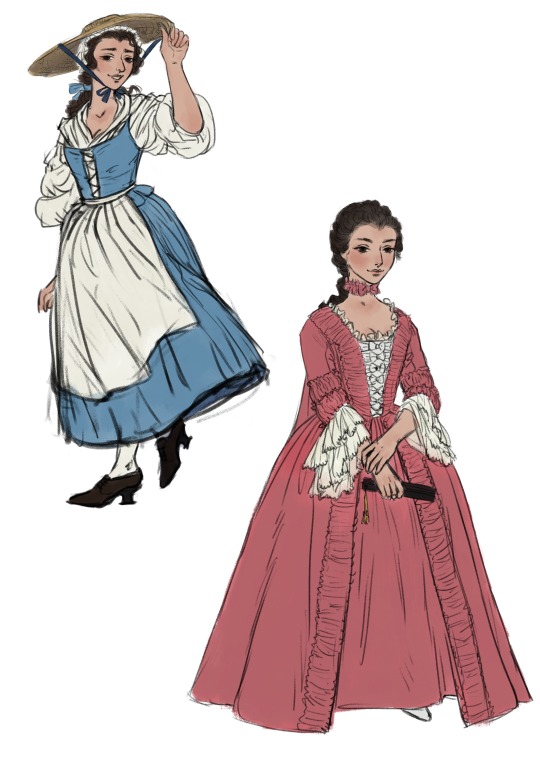

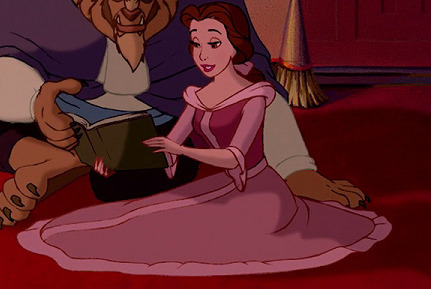
(While I was searching for the pictures of the original designs for this post I realised I had forgotten the existence of the green dress, which I think she wears at the end of the film?)
I do love making these historical versions so I did do couple of sketches.
I made them based on around 1750s fashion, like the first Belle I made. I do have to admit that the blue dress is not exactly super historically accurate. I gave her jumps, usually a sort of waistcoat that's laced (usually unboned or very lightly boned) and works as a replacement of stays. Usually when they are depicted in art from the time, they are used by working women while they are doing physical labour. Which makes sense, you don't have extra sleeves that might be too warm or hinder arm movement and they are softer than stays so they don't also hinder torso movement but are still somewhat supportive. But upper class women did wear them too as a part of negligee but not really at all in social situations. Then they were usually also quilted. I think it's pretty safe to say Belle is not working class. I think her father could be classified as craftsman and being from that class does make sense to their social status. That would make them under the merchant class and basically roughly lower middle class in 18th century French standards. They do live in rural village though, and jumps seem to be more depicted on rural settings and on peasants too. They are very informal, but it also seems like rural social settings just tended to be more informal. So I think that could lend a little more plausibility.
If I would have taken a safer route I'd given her a jacket/caraco or a round gown/robe a l'anglaise, which were commonly used by middle and lower classes and also upper classes for casual wear. People at the time generally didn't go outside without covering their head. Most women wore caps at least during the day to keep their hair cleaner. In fancier evening occasions (mostly only upper classes and upper middle classes would attend those) they would not cover their hair. Also hats were popular and I've seen several of these very wide brimmed hats, usually made of straw, on artisan and peasant French women.
For her pink gown robe a l'anglaise would have worked too, as it was clearly semi casual, not negligee, but also not the ball gown. But being a castle of a prince and it being used for a dinner scene, robe a la francaise works better, as at the time they were used for salons and other fashionable but not very official gatherings (not outings though) by the nobility. I could have also given it the kerchief, it would have fitted better the look of the original design's neckline made it a little less formal, but maybe we can imagine this is how she wore it to the dinner and she'd had worn it with a kerchief during the day or something.
#not me overthinking historical clothing of some silly little sketches#art#fashion history#fanart#answers#anon#beauty and the beast#historically accurate belle#historically accurate disney princesses#disney fanart#disney#18th century fashion#historical fashion#my art
300 notes
·
View notes
Text

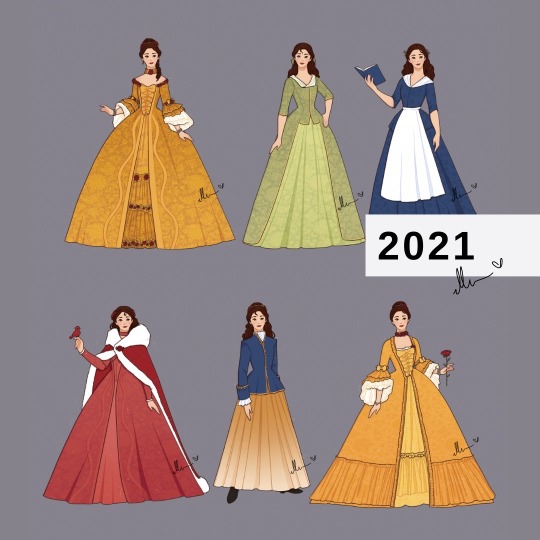
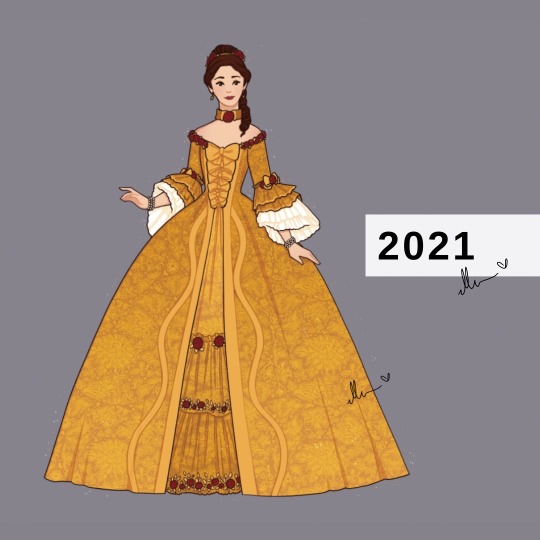
Whatever could I be reposting these for? I guess you’ll just have to wait and see…
I would say it’s weird to look at the gap in years from there to here but 2022 was pretty fiercely dedicated to the Game of Thrones redesigns. Well, I guess there was also modern Belle…. But the Tale as Old as Time dress is the one that matters in reposting so… that’s the only hint you’ll get!
I am the artist! Do not post without permission & credit! Thank you! Come visit me over on: instagram.com/ellenartistic or tiktok: @ellenartistic
#beauty and the beast#redesigning disney princesses#redesigning heroines#ellenart#character design#costume design#digital illustration#historically inspired#historically inspired disney princesses#historically accurate disney#redesigning belle#the great belle redesign#belle#historical fashion
488 notes
·
View notes
Text
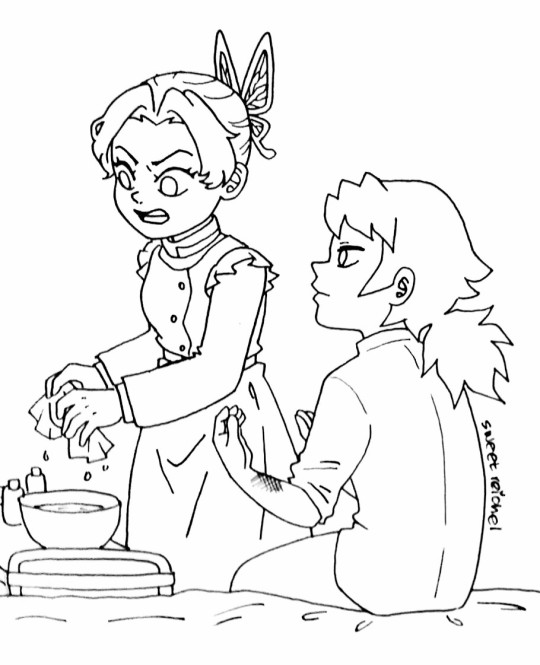
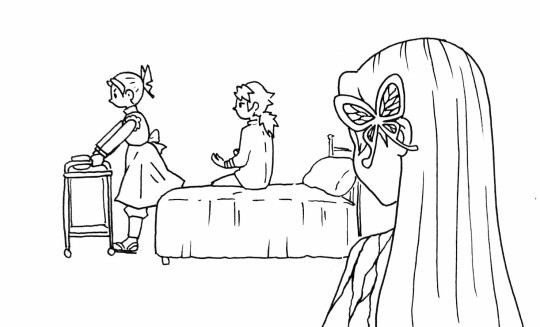

These medical procedures are 100% accurate trust me I'm a doctor 😎
#tomioka giyuu#kocho shinobu#kocho kanae#kimetsu no yaiba#giyushino#giyuu x shinobu#so i have been thinking about what giyuu and kanae's relationship was like#and i ended up with a hc that she was important for giyushino in the long run#this is deeper than it seems i swear hahaha i just like drawing the cheesy parts#btw just look at shinobu being just like aoi <3#also. no i didnt research if thats historically accurate in fact i just subconsciously drew it like belle cleaning up the beast's wounds#sweet reichel#fanart
311 notes
·
View notes
Text
What I wanted Belle’s dress to look like in the live action movie:
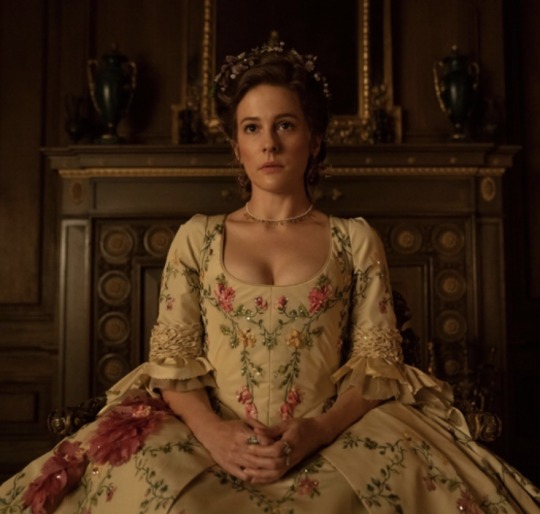
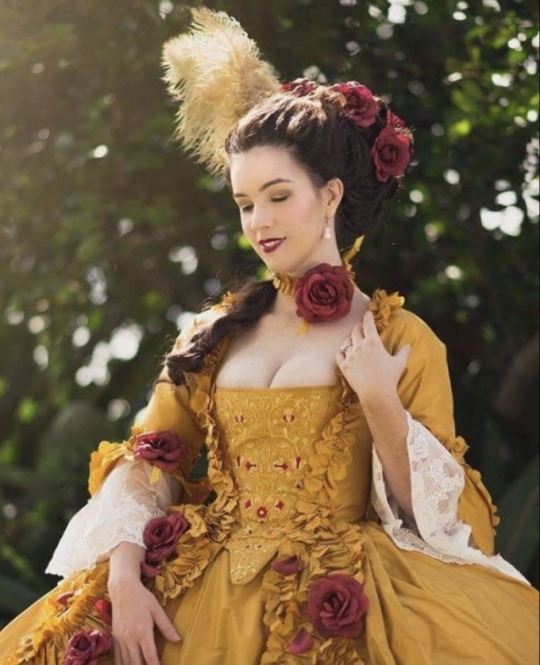
What we had got instead:
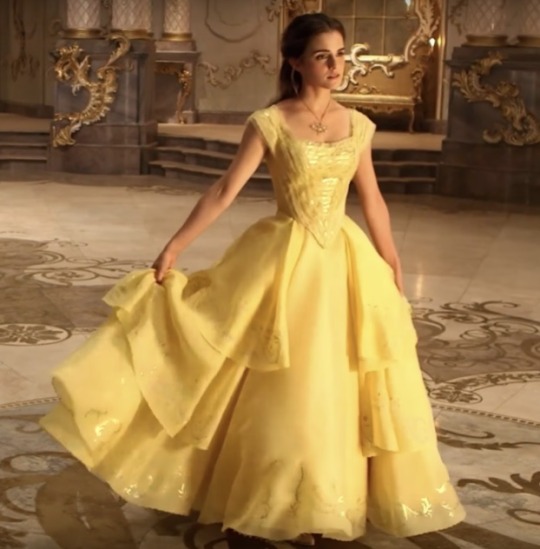
#beauty and the beast 2017#belle#the design is pretty don’t get me wrong but#where is the flavor#I just wish that it was more historically accurate#what on earth is this
12 notes
·
View notes
Text
Dance with me in a fairy circle and gaze in my eyes lovingly as myriads of deformed fae drag us to the depths of their twisted lands
5 notes
·
View notes
Text

I think using hook-and-eye tape for this bodice lining (which won't even be seen from the outside) might just be the best decision I've ever made in my LIFE. (I'm notorious for having to pin things closed at events because I ran out of time to put actual closures on. 😬😂)
#Sewing#Belle Époque ball gown#Is it historically accurate?#Ehhhh... Not EXACTLY?#But I'm calling it close enough for the inside of the dress
8 notes
·
View notes
Photo

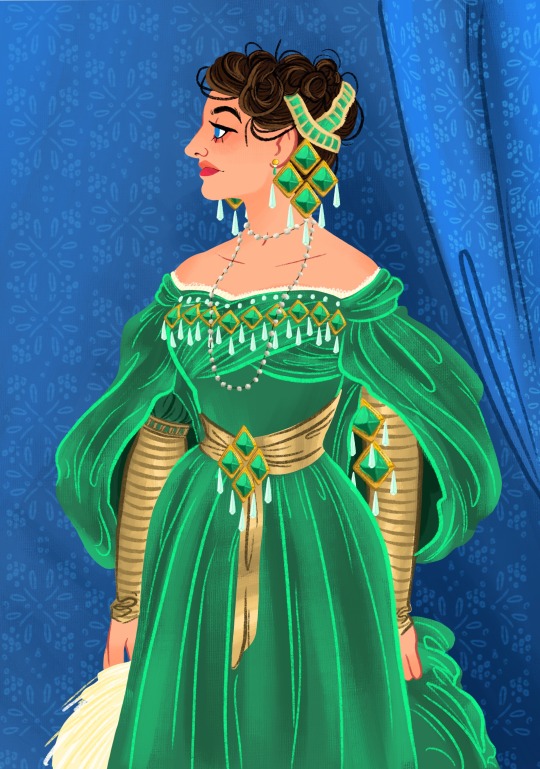
miss a. van nostrand at the new york patriarch’s fancy dress ball - january 1892, and 1893
#THE PUSS COLLAR IS CURSED AND HISTORICALLY ACCURATE IM SORRY#1883 VANDERBILT BALL HAD SOME WILD OUTFITS#zachary deyassified her in 1893.#depressing. rip queen the puss necklace is too powerful.#art.#🕊️❝ the most generous of souls ( lady a. comstock. )#she reps the slutty biseuxals love her.#the first image is banned in columbia no one needs to see the holy mother wearing a collar and bell that just says PUSS on it
13 notes
·
View notes
Photo

Belle’s yellow gown in a more historically accurate style.
2 notes
·
View notes
Text

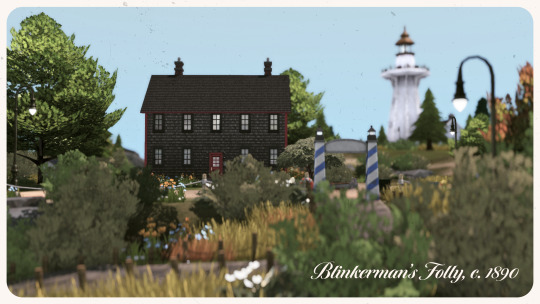
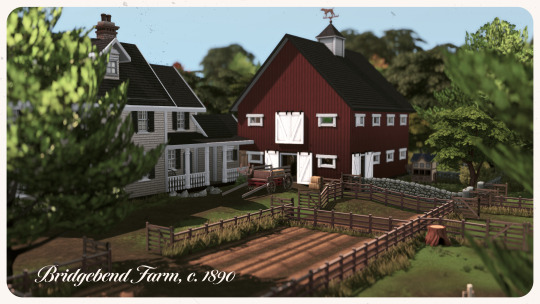
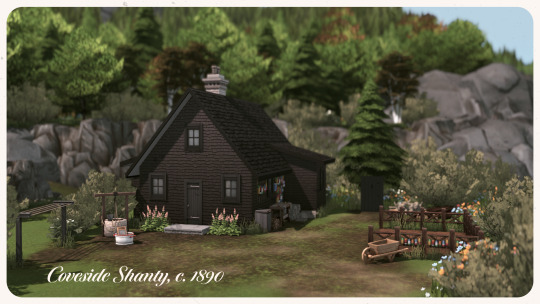
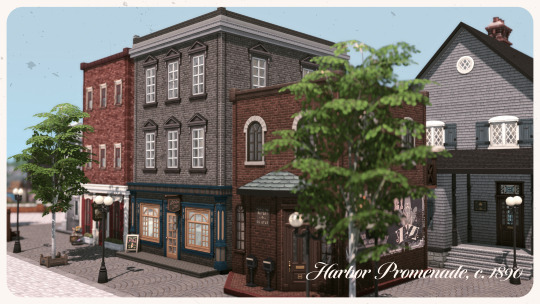
Antiquated Brindleton
An 1890s Decades Challenge Save File
This save has been almost a year in the making, but it's finally here! It includes a completely rebuilt Brindleton Bay inspired by historic New England towns and set in the 1890s. This save uses a light amount of historical cc and most of the packs.
Download and details under the cut:
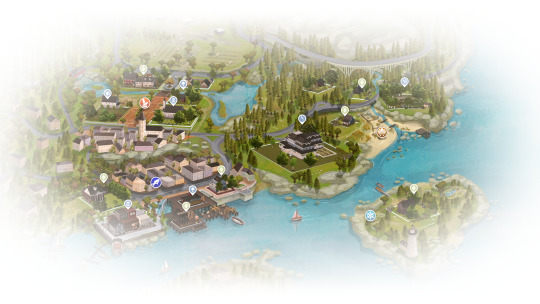
SAVE DETAILS:
Includes:
Eight new residential lots
Seven new community lots
Six new households
Builds and households are all located in Brindleton Bay. The world is intended to be historically accurate to about 1890, though some liberties for functionality have been taken.
Builds in other worlds have been deleted. The necessary buildings, like dorms, active career lots, and the high school, have all been left in place.
Townies have been evicted, but not deleted, as I prefer EA townies to fully randomized townies.
If you’d like more period appropriate townies to add, the lovely @jewishsimming has some great historical ones to download and @cowplant-snacks has an amazing tutorial on how to manage your townies with MCCC.
REQUIREMENTS:
I have all the packs except Batuu and some of the kits. I didn’t limit myself when building. I don’t have everything listed out here, but I will be uploading all the lots and households to my gallery, so if you’d like to know specific pack usage you’ll be able to check there.
If you load in and things are replaced or missing and you think it looks obvious feel free to message me, I’m always happy to try to help you find something else that fits!
This save includes historical CC, some is included in my download in folders and some you will need to download from the creators directly. The CC required is listed and linked below, you need to download these linked pieces in ADDITION to the included cc folders.
CC To Download:
@lilis-palace
FOLKLORE Set
@s-imagination
Cottage Kitchen Stuff Pack
@happylifesims
1840s Suspenders Outfit
1900s Male Hunting Fashion
1920s Nightgown
Piteous Outfit
Sylas Fashion Set
Wilbur Outfit
@satterlly
Medieval Nightgown Della
@vroshii
Functional Tennis Set
@vampireloreskill
Antique Standing Camera
Creators Whose CC I Included:
@ameyasims (Better Than a Bush Outhouse, Victorian Swimwear)
@buzzardly28 (Multiple women’s hairs)
@chereindolente (Sacco Chore Coat, Edwardian Child Clothes)
@gilded-ghosts (Boudoir Belle, Victorian Visions, New Woman)
@jewishsimming (Off The Grid Objects, CAS items)
@linzlu (Assorted CAS and BB items)
@the-melancholy-maiden (Victorian Hair and Hat)
@nolan-sims (Potbelly Stove Set)
@pandorasimbox (Get To Church Pack, Azariah’s Sack Suit, Antique Slipper Tub, Heirloom Silhouette Portraits)
@peacemaker-ic (Simple Siding Wall Set, Luxurious Single Bedding V2)
@plumbobteasociety (Some BB and CAS items from the Cottage Garden Pack, HSL Happy Birthday Set)
@twentiethcenturysims (Langtree Hair, Historical High Chair, Quilts for Kids)
@waxesnostalgic (Sportswear Separates, Peterpan Bodysuit)
Thank you to all of these wonderful creators, your historical cc creations make this game a million times better to play and I appreciate all of you so very much.
Recommended but not required mods:
Timeless by @pandorasimbox
Default Map Replacements by Deshayan (if you’d like your map to look like mine does in the preview)
Victorian NPC Replacements and Llama Scouts Historical Replacements by @cowplant-snacks
Home Regions by Kuttoe
DOWNLOAD:
There are five zipped folders to download, four of which contain included cc, and one which includes the save itself.
Download the "AB_SaveFile" folder, unzip it and simply move the file inside to your saves folder inside your Sims 4 folder (where your mods folder is located).
The included cc is in four folders (to allow for easier upload/download) for build, buy, clothing, and hair. Simply download the folders, unzip them, and place them in your mods folder.
After this you should be good to load up your game and get playing, let me know if you run into any issues, I'm happy to try to troubleshoot.
SFS | Google Drive
THANK YOU:
To all my amazing testers: @epistolarysims @aheathen-conceivably @cowplant-snacks and especially @simadelics who edited my household and build descriptions.
If you use this save file, please tag me in any photos you take, I want to see them all!! This save has been my baby for so very long and I cannot wait to see what you all do with it!
@maxismatchccworldrld @mmoutfittersters
#ts4 save file#sims 4 save file#save file#ts4 decades challenge#sims 4 decades challenge#ts4 build#sims 4 build#ts4 historical#sims 4 historical#sims 4 history challenge#ts4 history challenge#antiquatedbrindleton
2K notes
·
View notes
Text
Unnecessarily Convoluted Analysis of TWST Dorm Architecture
Putting that Art History degree to use 💪 I am getting my Masters in art history, so I am like semi qualified?? to do this. Tried my best with some of the dorms since some don't have an explicit cultural/architectural parallel irl. And obviously lots of liberties taken since I'm sure the people at Disney were not going for historical accuracy
Masterlist here
Much of this analysis can from my Spolia fic (Malleus x Light Fae MC)
Diasmonia: Early Gothic
Gothic- but early gothic. It's got a few flying buttresses, indicative of technology in later gothic movements- but in combination to the lower ceilings (lower than later gothic), fewer levels (celestory, triforium, doric columns, and shorter windows makes me think it's early gothic (more towards Norman architecture/Sens Cathedral), because it's a lot simpler and less technologically developed than high gothic (larger windows, rose windows, higher and pointier style, flying buttresses, more decorative stuff like Corinthian columns and stained glass). Still, I think the Fae would be been more concerned with its structural integrity against the waves of time- therefore gargoyles become a very prominent symbol in protecting this eternity and preservation of architecture since it basically prevents rain/weather from eating away at the building.
There's some interesting symbolism with Malleus' fixation with gargoyles, but I'm sure you can make that connection on your own based on what's out in Chapter 7 and how he reacts to both Lilia's and MC'S impending goodbyes.
Gothic was actually a term used by the French to demean the style, since it was seen as more 'savage' and 'lower' than classical architecture- which is symmetrical, solid, and values very literal and realistic (albeit idealized) characterization. Gothic architecture in contrast is a lot more airy, focuses on light and windows, and values more allegorical representations, which is why it resonated so well with the religious ruler and monarchies because they were able to not-so-subtly point to their influence and power in every single way without it being in your face all the time.
Because of this very stank contrast, it was labeled as "gothic" because people were criticizing it to be "savage" and "unkept". The goths were painted this way because they were mainly responsible for Rome's downfall, leading to the dark ages. Regardless of the French ruthlessly roasting the goths, this type of design flourished after the dark ages because technology was beginning to be advanced once more, and materials were more readily available.
My theory would be that the fae began to first develop this architecture because they had the advantage of magic, but then the humans were influenced by it- which leads them to high gothic (Noble Bell College), as well as Baroque and Rococo architecture (like the Pomefiore dorm). The Fae kept their style of early gothic since they didn't really see a point in changing much- maybe just more decorative gargoyles called grotesque as a symbol of the Fae's gratitude in their protection against time.
Also the hallways have what are almost like ribbed vaults which was one of the primary and first symbols of gothic architecture because they allowed more weight to be distributed to the vaults, and therefore allow for bigger windows.
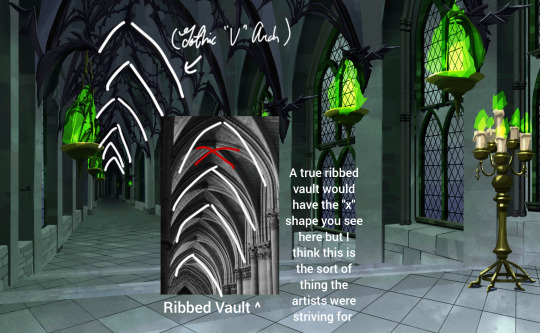
Another distict characteristics in gothic architecture are clearly defined elevations.
Traditionally, they will have the celestial at the top, then gallery, then the main arcade (especially as we get into the later gothic periods and buildings get even taller and taller). Of course Disney isn't completely accurate with these things, but it seems that they're sort of going for that vibe, as many things end up being as our contemporary notions of historical design often creates a vague iconography of things that is often a copy of a copy of a copy of the original medium.
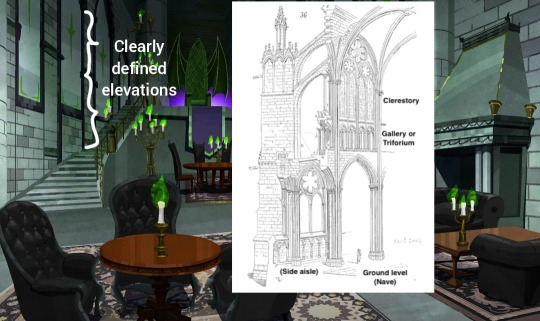
However I do think the intention to mimic the original design is still there overall, and combined with many of the other elements such as the prevalence of pointed arches that are a symbol of gothic architecture, and the sheer number of windows that were allowed originally due to the technological advances of the gothic era (and of course Malleus' own obsession with gargoyles), I think it would make sense to categorize this is like "gothic adjacent".
If I were to redesign the diasmonia dorm however, I would definitely begin by fixing the exterior- but I think they were referencing Malificent's tower in the Disney movie than any sort of historical accuracy lol. You win some, you lose some.
Pomefiore: Rococo with a touch of Art Noveau
Very obviously modeled after French Rococo architecture- the illustration of the hallways of Pomefiore dorm are almost exactly like the Palace of Versailles
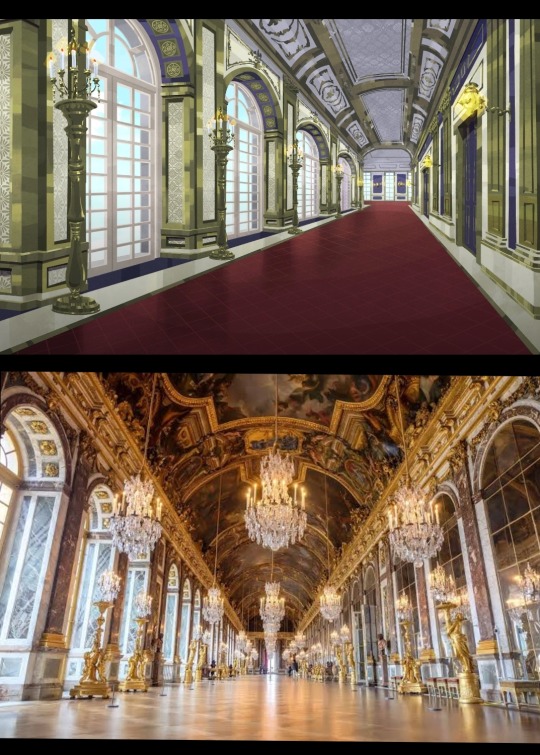
It is definitely a toned down version- but pretty spot on, right? When I first saw the Pomefiore dorm I immediately Googled a picture of the Palace of Versailles cause I knew I saw it somewhere. Autistic spidey senses at it again.
Honestly wish they went more all out with the chandeliers, and had painted ceilings on the dorm colors- but I feel like they got the general vibes right. It feels closer to Romanesque with its simplicity but it still holds an aura of decadence and frivolity that I like. Very rich, extravagant like it's members (maybe not so much Epel lol)
Elements of Art noveau in the furniture (the peacock chair) and the embroidery of the uniforms.
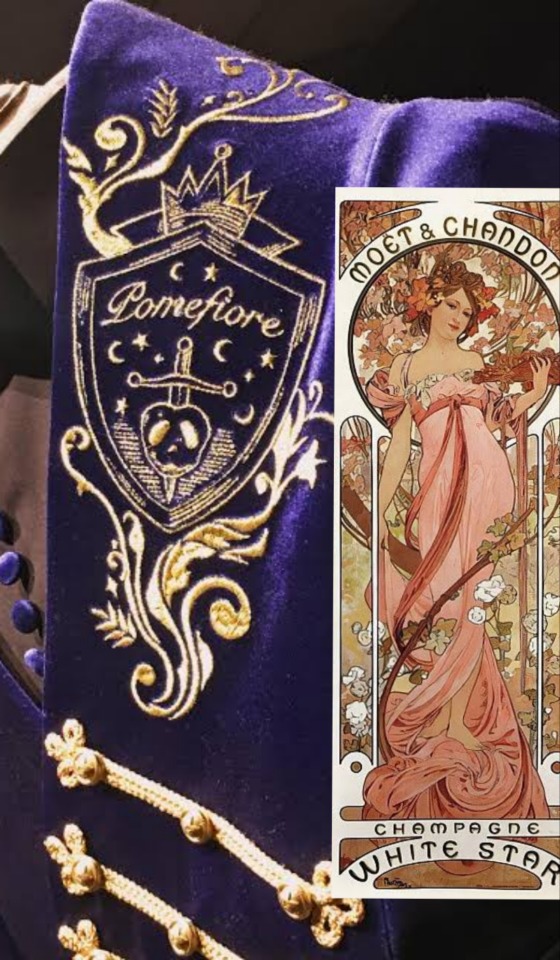
Also, the peacock chair sort of reminds me of James McNeill Whistler's Peacock Room. He was an American impressionist that was sort of the forefront of art nouveau, since impressionism was one of the mainstream movements that really began the explosion of Japanese inspired design that is also used in Art Nouveau aesthetic.
(Vil would definitely have this room if he could)
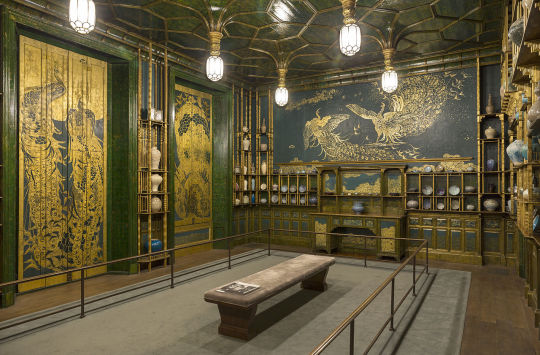
The carpet in the room reminds me of William Morris' designs, and just art nouveau in general.
As far as I can tell, the exterior is based on a variety of German castle styles from 13th century Romanesque styles, to 18th century Neo-Gothic styles. Which is coincidentally what a lot of the castles on Disneyland are based off of.
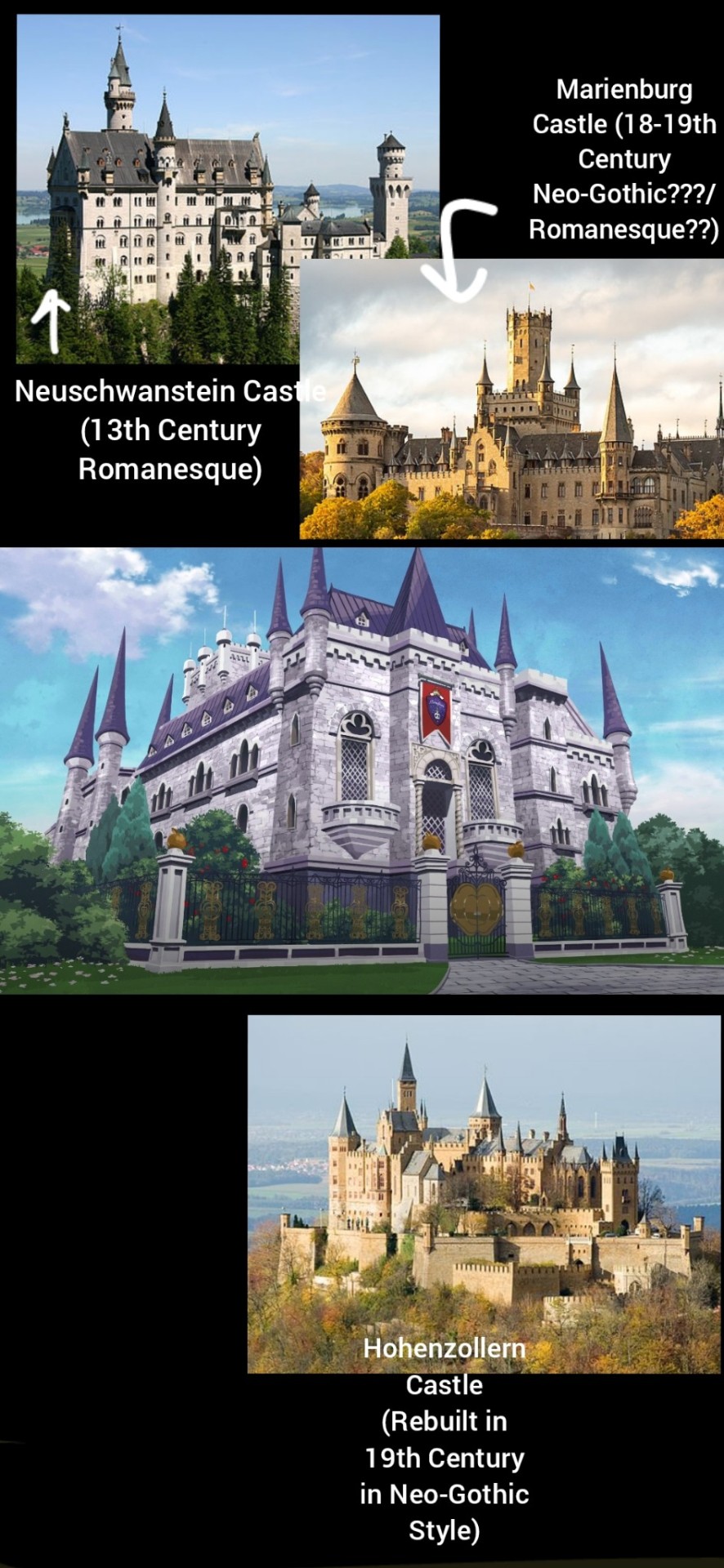
Everything is very florial, Corinthian, and extravagant. I love it. It's very baroque, I dig it.
Scarabia
Please don't come for me I'm not as well versed in Non-Asian and Non-Western architecture except for religious architecture in Turkey and Jerusalem so I'm gonna try my best with this one
So I think it mixes a lot of the icons we think of in association to Arabic architecture like domes, pointed/ogee (rounded, then pointed)/multifoil (multiple curves) arches, and ornate floral designs that derive from the use of calligraphy in Islamic structures (as iconography, or pictures depicting the faces and bodies of religious figures were not allowed).
And I think all those tiny buildings resemble Minarets, or tall towers built adjacent to mosques where the muezzin can issue the call to prayer. But the artists were probably like "hm. Not enough. How do we make it more arabic??" And of course the contemporary orientalist perspectives that dominate the artistic realm made they go "quick just add a bunch of domes"
I think Kalim's room and the lounge in particular best shows the general "airiness" that parallels Islamic acthicture (ie the Sheikh Zayed Grand Mosque on UAE)
Open air courtyards are also a characteristic element of Islam architecture, which you can see with the areal view of the dorm, and also makes sense with Kalim's unique magic.
Jali window designs (the intricate gold metal covers on the arches) are also popular on Islamic architecture
The Haga Sophia in particular has been described to have a dome "suspended by the heavens", as the section connecting the building and the dome is made entirely of arches that allows the sunlight from the heavens to pour inside the building. Though the haga Sophia is a very special case, as it was occupied by varying religions with different architectural styles at certain periods- I think it's also a good representation of our contemporary prototype of Arabian architecture that makes up the final design of the dorm.
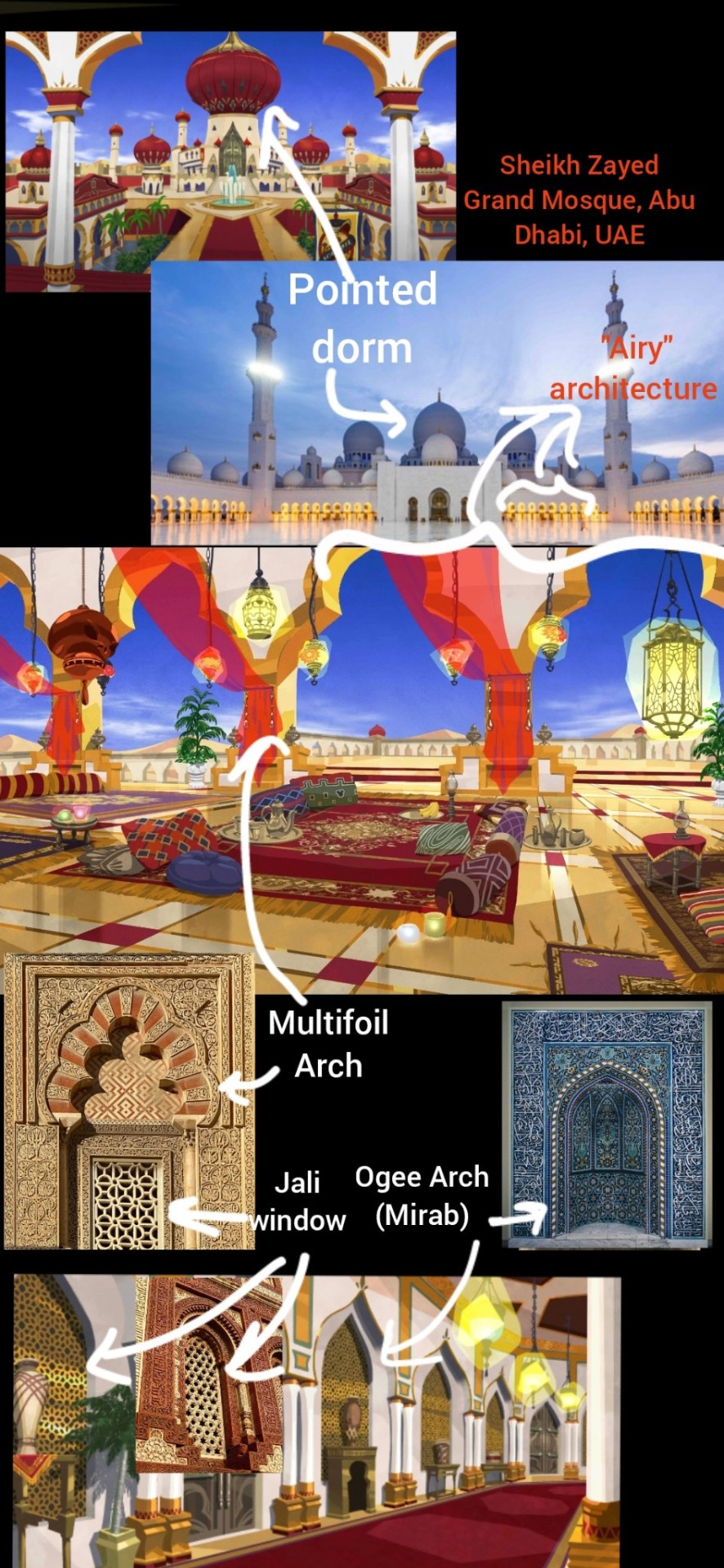
Ignihyde: Classical Greek
Looks like it's modeled after the Parthenon, which was built during the Classical period on Greece where Athens was flourishing as a center of mathematics, technology, and architecture. These are sentiments which becomes reflected in the Renaissance afterwards, such as symmetry and a very systemic way of approaching things. I think it fits perfectly with this dorm, since they're the "tech geeks" of NRC
It's got your pediment, your doric columns (would have preferred ionic columns but whatever Disney), your arcades. Pretty straight forward unlike the actual movie it's based off of lol (Hercules has so so many mythological inconsistencies. Like why are you talking about Achilles in the movie??? Trojan was hasn't even happened babe stop manifesting that shit)
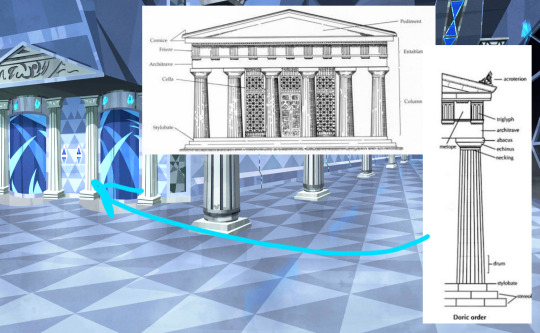
I think the symmetry and order of Classical Greek design goes well with the overall futuristic look Ignihyde and the Island of Woe are going for. Pretty clever, Disney.
Heartslabyul: Tudor Revival Style
Though Alice in Wonderland is set in the later 19th century, I think the Tudorian Revival style than began in the beginning of the 20th century just shortly later fits best.
Turdorian revival style is characterized through half timbering, which is like the timber panels you see on the surface of the building; oriel windows (windows that jut out); mock battlements; and courtyards.
The Tudorian revival style also takes elements from Elizabethan era architecture and perpendicular gothic architecture, hence the long gallery and the tudorian four point arch)
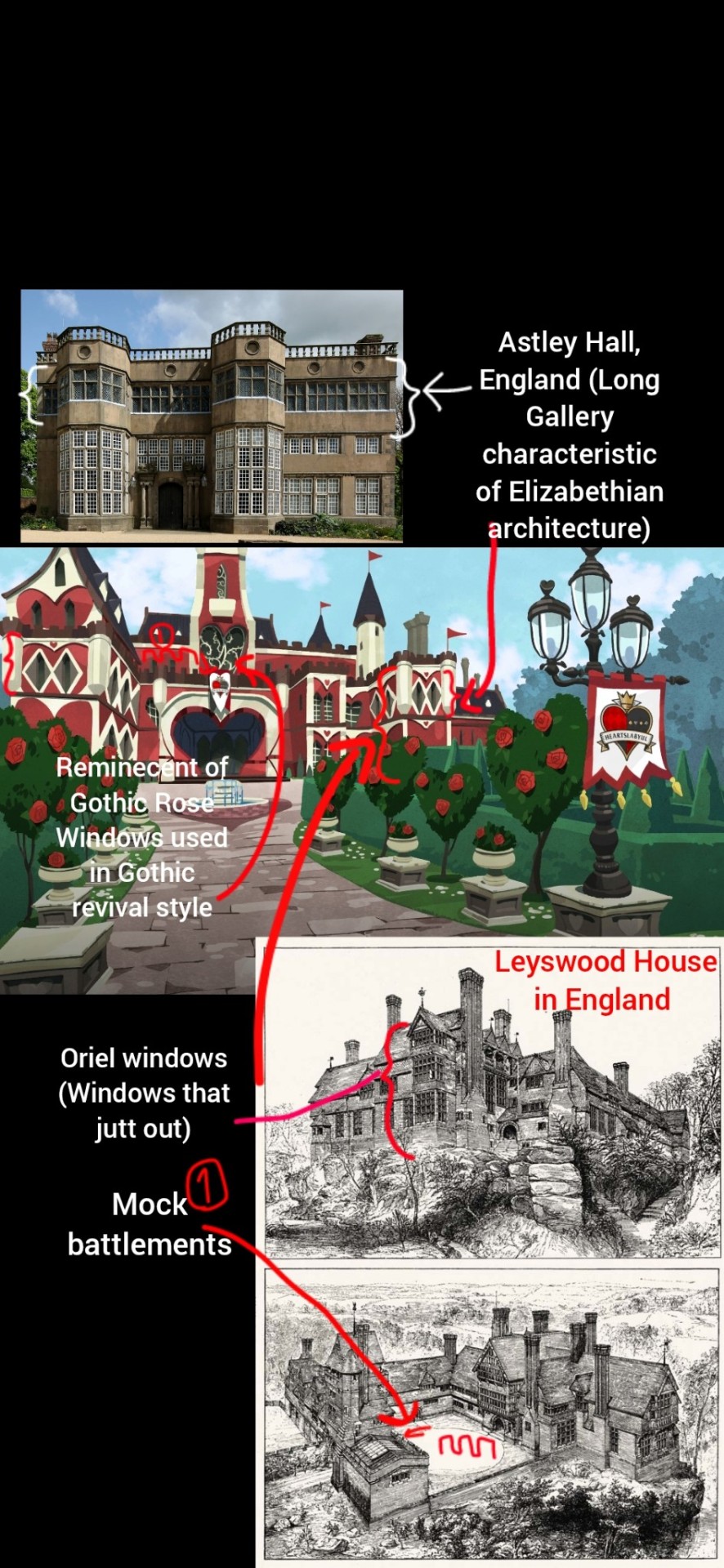
The glass panes in the lounge leaves me to believe it's sort of like a glass house where part of the house is sort of like a greenhouse. This is characteristic of Victorian glasshouses that rose with the availability of timber, paint, and brick and the popularity of botany in the Victorian era propelled by botanical imports from British colonies. Architecrs like Joseph Paxton were also known for his opus magnum- the Crystal Palace, which held the Great Exhibition of 1851 (kind of like a world expo with the theme of industry and art) also popularize the movement- and was a significant sign of wealth, as glass and window taxes were especially high. But in the later century when iron and steel frame construction was advanced, people could be built out of iron and window panes, so they could be assembled easily, and also afforded by middle class citizens.
So it's basically a mix of Elizabethan and Victorian revival styles (tudorian and gothic), which is in theme with the Victorian period the original media is set in, albeit taking inspiration from styles little later in the period.
Savanaclaw:
Again- I am blind when it comes to Non-Asian/Non-Western architecture- but this one was kinda confusing cause it really doesn't have any architectural cohesivity??? Like it's just got a general "jungle vibe" which I'm not surprised at because Disney is infamous for glossing over non-white cultures and kind of just simplifying them into a "general vibe" which wow yikes my guy
Kind of reminds me of Mese Verde, which are structures made directly within a cliffside, or the Great Mosque of Djenné and the African Heritage house in Kenya which have very smoothed, natural designs that blend into the environment
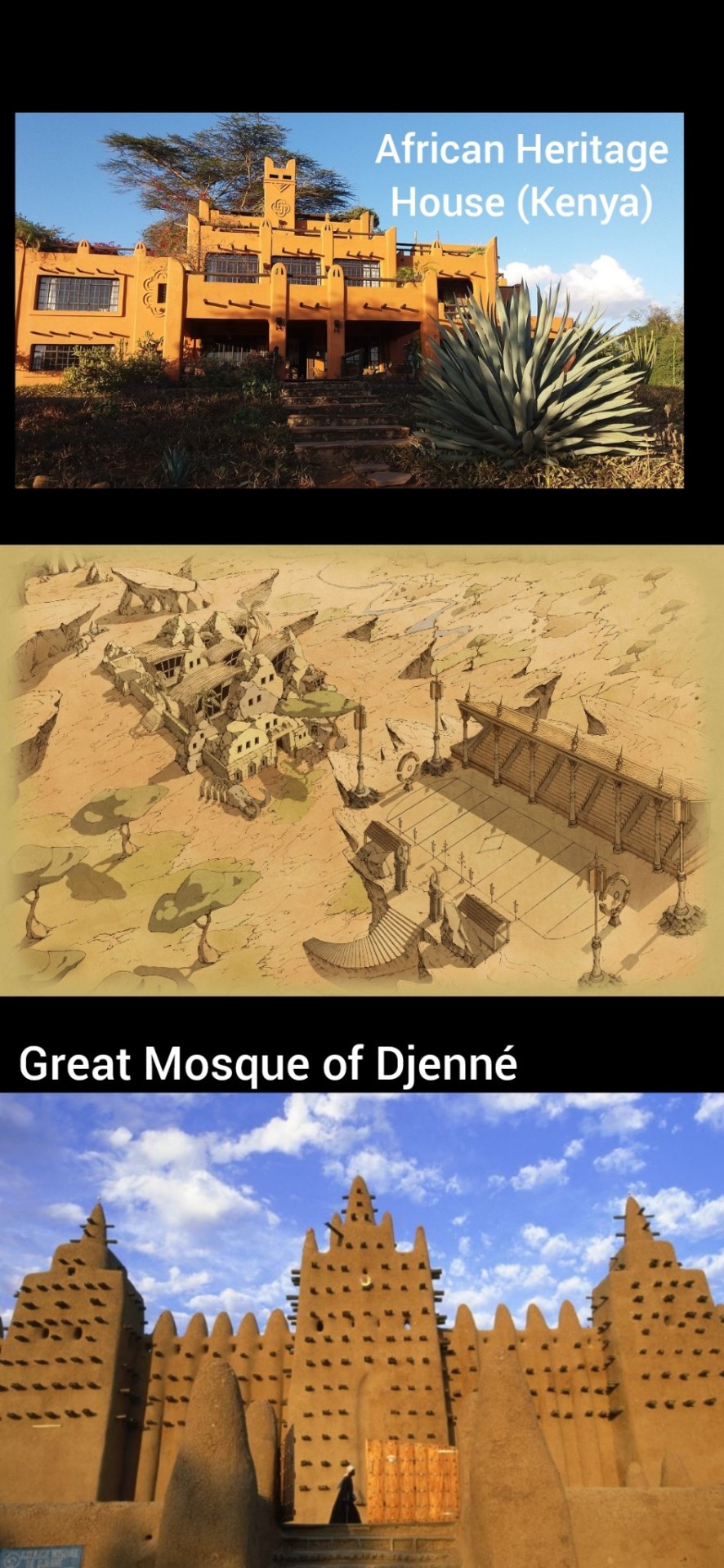
What I could gather from my research and my juicy autistic brain, savannas are regularly subjected to wild fires- so a lot of the heavy, rocky architecture and interior style makes sense, opposed to one made of wood (which are mostly in the inside of the structure, besides the roof which I imagine is less likely to catch on fire). Much of the building seems also to be directly carved within natural rock formations- a very functional use of the resources around you- very savannaclaw!
The textiles in each of the dorm members' rooms resemble Kente fabric, a style of hand weaving from Ghana, originally reserved for royalty but now commonly worn for ceremonial occasions and such. Also unlike other African textiles styles, it's strictly a male practice. I think it would make sense for Sunset Savanna, a place where women are highly respected and perhaps take on more political and military positions- leaving largely men to the practice of textile making (both are honorable acts- not comparing the two). There aren't distinguished aesthetic styles of textiles that differentiate each weaving from another- rather, it is divided by technique and region- so this is not like a definite connection, just thought it was interesting to includle
Textiles seem to occupy the only decorative role in the entire dorm- so perhaps there is significant cultural significance? Maybe there is a certain region that's known for their practices? Or is weaving a symbol of adulthood or growth and therefore is why they're hung up in each of the dorm member's rooms with the exception of Ruggie, who may not have had the socioeconomic privilege of making one? Or does the practice vary across species? Much to speculate 🤔
Octavinelle: Art Deco and Art Nouveau
Saved this one for last because oh boy I don't even know where to start with this. Obviously the design is very creative and I love it, but there's a lot less historical elements I can use to analyze the style, kind of like the Savanah claw exterior.
But it leans towards the art deco style, which is most fitting for the business dorm I think.
Elements of Art deco like geometric aspects of design, thematic and aesthetic consistency, and decorative/geometric windows are seen throughout the dorm interior and exterior
But I think the art nouveau elements are also there too, with the cheeky sea-themed elements that use natural shapes and icons into the architecture, design, and surfaces of the dorm.
Otherwise, not much else to say about this dorm 🤷 it's not really based in anything historical but there are bits and pieces of art nouveau and art deco in there, but I definitely wish they would lean more into the art deco elements since I think it would go well with the general themes of the dorm values.
So uh, yeah. Told you it would be convoluted.
Feel free to add and or correct!
#twisted wonderland x reader#twisted wonderland#twisted wonderland analysis#art history#twisted wonderland theory#diasmonia#pomefiore#ignihyde#scarabia#heartslabyul#octanivelle#savanaclaw#twisted series#twst analysis#lilia vanrouge#malleus draconia#rook hunt#vil shoenheit#epel felmier#idia shroud#ortho shroud#ace trappola#deuce spade#trey clover#carter diamond#twst silver#sebek zigvolt#architecture#leona kingscholar#ruggie bucchi
826 notes
·
View notes
Text
In Defense of BioShock Infinite
Although I had preordered BioShock Infinite with all its bells and whistles, I did not actually play it until January 2023. And lordy, I had me another Experience with a capital E. How the hell a bunch of urban Yanks could capture my experience as a queer democratic-socialist atheist struggling with her roots as a rural evangelical-cum-fascist is kinda magical, honestly. As to the game itself, it didn’t hurt how good it looked—the kickass skyhook gun battles—that novel setting—the complex characters—that delicious historical setting—that bloodthirsty critique of America—and to top it all off, they had pulled yet another Cassandra. Hell, speaking of which—not only was the game fun, it was fucking smart. It was intelligent, memorable, and meaningful in a way I hadn’t experienced in video games for years.
Now, back in 2013, when I had realized that I would be spoiled for Infinite, I left the BioShock fandom. After completing the game, I headed to Tumblr to re-engage, wagging my whole body like an excitable golden retriever, only to discover that BioShock Infinite was remarkably absent, and when mentioned, brutally derided.
“I hate BioShock Infinite and all my friends do, too,” someone said in the tags under a post.
I was utterly befuddled and deeply sad. I wanted to talk about BioShock Infinite! I wanted to dig into it, uncover unexpected ideas, learn new things, talk shit, make new friends—the full fandom experience. And instead I kept stumbling into hateful diatribes and super-charged disgust.
Obviously, I first looked at myself and my own judgment. Had I missed some obvious problem or misread some theme or dialogue? This wouldn’t be the first time I’d snapped down on a hook. But the more I thought about it, the angrier I got.
There are two parts of BioShock Infinite that are unquestionably terrible: the fridging of Daisy Fitzroy and the false equivalence of violence between haves and have-nots (lol what are the have-nots supposed to do, ask nicely?). Additionally, one could look at the use of real Native American tragedies as tasteless. Personally, I do not—in the same way that I don’t find it tasteless that real war victims were used as inspiration for Splicer deformities. This is what really happened; this is commentary on events that really happened to real people.
At this point, I’m sure I don’t have to explain why two of these themes are Unequivocally Bad.
Anyway, I thought that perhaps these were the reasons BSI had been condemned to Super Hell.
I was wrong.
How Criitcsim Werk
This wasn’t the fandom I’d made friends in over 2010. Hell, this wasn’t the fandom of 2013. This was a fandom made up of Babies. They were making their first coltish stumblings into media criticism and with it, dredging up the same brain-dead bullshit from Tumblr circa 2008.
Suddenly I was brought face to face with people who seemed to think that if a character couldn’t be likable or good that the story itself couldn’t be likable or good; that one bad element means the story is unsalvageable (lol u pussies); the implication that one is bad for liking it; the destructive juvenile insistence that media accurately measures its fans’ moral qualities en masse like an astrological sign. This goes far beyond simple like or dislike and plunges head-first into Puritanism: praying loudly on street-corners instead of quietly in a dark corner where God might hear you.
At one point I had a kid go off about how they wouldn’t take time to understand Booker DeWitt’s perspective because he had (fictionally) taken part in a genocide. (That same person said the Native American element had been employed for shock value, a thought that sometimes keeps me up at night, because it is legitimately one of the dumbest criticisms the game has ever received.) At another point I saw someone acting personally offended that (fictional person) Dr. Suchong’s (fictional) data was being stolen (in a fiction) by a (fictional) racist who would (fictionally) take credit for (fictional person) Suchong’s (fictional) inventions “while calling him slurs”. Sure, a better question would have been, “Why would the creative team opt to do this” rather than assume intentional racism from a Jewish creative director with an in-office multi-ethnic team in the year of our lord 2013, but why not handwave the choice with prurient moral dismay so your audience won’t beat you to death with bats?
It was as though fans were treating these completely fictional characters as real people whose personal gods had opted to torment them, and that their tormentors merited the kind of censure that psychopaths should receive. As I hope all of you understand, this is fucking madness.
More than once I saw people posting about hating the studio or the creative director in ways that seemed intense, unreasoning, and excessive—notably an “I Hate [Irrational Games creative director] Ken Levine” stamp (rofl the more things change amirite). People get so performatively moralistic about it that I started wondering if I missed something big along the way. Was there some secret Voxophone I missed swearing fealty to baby Hitler or some shit?
Double Standards
At the same time, I was utterly confused. BioShocks 1 and 2 both featured some absolutely ghastly bullshit based on real-life horrors and a thick mix of complicated human beings—many of them victims who have become monsters. The fact they are grounded in historical tragedies is a huge part of their appeal. Hell, I don’t think those games would have had half their meaning without World Wars I and II and the threat of a third.
A gay man who feels so cursed by his orientation that he is incapable of intimacy and systematically destroys his ex-lovers—including the man he loves the most. A Korean who survived Japanese occupation and a Jewish Holocaust survivor repeat the violence and traumas exacted upon them and their people, subjecting a new generation to agonies unthinkable. Chasing the shadows of Bolsheviks, a Russian citizen becomes the brutal tyrant that he loathed. A rich lawyer with an easygoing drawl designs a concentration camp and systematically harvests hundreds, if not thousands of political prisoners, selling them out to medical testing for a quick buck.
But a Native man who destroys his own people and class to ensure his own survival and social acceptability is too far? This character is where people drew the line, so much so that the entire game is disavowed? Hell, if you’re just talking about Booker (rather than Comstock), he doesn’t have anywhere near the largest bodycount. If we were to judge on the metric of human misery alone, Booker wouldn’t even hit the top ten.
Keep in mind that the most-discussed BioShock game on Tumblr is BioShock 2, and that one of the biggest fandom favorites is Augustus Sinclair—the easy-talkin’ Georgia lawyer who sells your character into horrors past all human comprehension, as he sold hundreds before and after you. Sinclair is a motherfucker so vile that BioShock 2 gives you no choice but to murder him. But Sinclair is also pleasant; good-looking to some; spends the whole game making sweet love to your ear; is one of the only true positive experiences you experience in a horror story. Unlike DeWitt, a man who is brutal and awful from step one, Sinclair is smooth and sweet. Unlike DeWitt, Sinclair’s victims are faceless, completely fictional, and carry no political or social baggage.
People fuckin’ ship this guy with Subject Delta, his explicit victim. He’s usually described as a squishy cinnamon roll. In most fanfiction, he often gets to escape to the surface and fuck Delta while helping raise Eleanor as Dad 2. It is rare that I find fanfiction that acknowledges his monsterhood in all its glory. In fact, I can only think of two.
Literacy Comes in Levels
My problem with the over-the-top hatred of BioShock Infinite is along the same lines as my confusion at Twilight and Harry Potter hate: there is so much worse out there (how much do the haters actually engage with media if they think this is that bad—yes, even considering the shitty creators themselves!), the hatred far outweighs the sin committed (in BioShock’s case, the truly bad bits are not central enough to derail the larger narrative), people don’t seem to hate it so much as they want to be seen hating it, fans want to enforce an unspoken rule hating it (bitches this is poison. Stop this), and there’s something about the hate that stinks of poor reading comprehension.
A great metric for general literacy is the newspaper. In journalism, you’re writing for the lowest-common denominator, which for years here in the USA has been about a fifth-grade reading level (about 10-11 years old, for my non-American readers). The AP posted an article a couple years back about how the general reading comprehension of Americans needs to be dropped to a third-grade one (8-9 years), and baby, I’m here to say it’s true.
Most of the problem is that the American education system is shitty as fuck. The rest of it is from an extremely American disdain of intellectualism and the arts. People are not taught how to interpret art or literature—a difficult and subtle skill which involves accepting such truths as “multiple contradictory readings can exist and yet be simultaneously correct”, “the author can be a complete tool and still be right about things”, “the author can be a great person and still write horrifyingly incorrect bullshit”, and “worthwhile works can be ridiculously long and it really is your fault for not having an attention span”.
Media criticism must be learned through trial, error, asking questions, confidently swaggering into a public space to announce your brilliant insight only to have your ass handed to you (usually by your older self ten years later), being willing to admit you swaggered confidently into a public space to state bullshit and then amending your bullshit only to produce more bullshit, and otherwise making a complete and utter cock of yourself. We are taught to fear and flee pain and failure, despite the fact this is how we learn and improve. Because we judge our value by whether or not we are “smart,” we are afraid of displaying that we don’t know something or might be mistaken–better not to try at all than to reveal ourselves to be fools. And yet the best way to learn is to crash up against someone else and be proven wrong!
American parents are terrified of hurting their children to the point that they spare them cognitive dissonance of any kind, disavowing difficult art—without any appreciation for the fact that art is how we provide safe spaces to explore key human experiences, better preparing us to face those difficult subjects when there are real-world consequences (sex, gender and social expression, grief, violence, predation, illness, interacting with people of different ideologies, whatever new issue is pissing off some smooth-brained old motherfucker somewhere).
If parents and teachers aren’t teaching us how to interpret art, we’re probably never going to develop the skill at all, or crash unsubtly into it in a piecemeal fashion (hello it me). Another unfortunate side effect is that these readers tend to be blitheringly superficial: they are literally intellectually incapable of reading deeper than the uppermost layer of a text. The curtains are always blue.
And let’s not forget the role moral performatism plays in media criticism, which although faaar from new, has reached hilarious levels in the age of social media. What’s important isn’t understanding something, it’s finding something to symbolically burn at the stake so everyone knows God loves us: please keep loving me, please don’t hurt me, please don’t throw me on the fire—for performatism is not for outsiders. We long for human connection so fucking much that it’s more important to destroy what might point out our fallibilities than it is to let ourselves stand in the furnace and burn out the dross.
What do you think the point of BioShock Infinite was?
Emotional Machines
Let’s face it. Human beings give a lot more credence to how something makes them feel than they do its complex invisible reality. We are not logical creatures; we are emotional ones. Our logic is too new a biological mechanism to override something as powerfully stupid as our primal lizard brains.
Knowing this, let’s take BioShock’s most popular characters. The first two are Subject Delta and Jack Wynand, the protagonists of BioShocks 2 and 1, respectively; and why not? They’re the characters we play. In the first two BioShocks, whether or not you kill Little Sisters determines the ending you receive. In other words, Delta and Jack can only be as “wicked” as the players are.
How do people want to see themselves? As good. What do people want to see around themselves? Good. (What is “good”? Uh, well,,,,,,) What do they want? Simple moral questions with simple moral answers. And in the first two BioShocks, what is moral is obvious: don’t kill little girls. It’s actually kind of insulting once you say it out loud.
In-fandom, Jack and Subject Delta are almost never painted as murderers or monsters, but as victims and heroes; I saw someone musing about putting Subject Delta on a “gentle giants” poll and I nearly choked on my own tongue. I only saw that musing because someone put Subject Delta and Jack in a “Best Fathers” poll. Nobody in-fandom really considers the “evil” or “complicated” endings as canon choices, despite those versions being fully understandable alternate readings, with a story that doesn’t make sense without them. (I don’t believe Burial at Sea is necessarily canon; in fact, I would bet good money that it is a huge middle finger lol, mostly because a number of brain-dead motherfuckers won’t take unhappiness for an answer.)
Most fandom art and writing is gentle, sweet, good: the symbolic healing of the damaged, the salvation of innocents, the turning of new leaves. These things are not just saccharine sweet—they tend to be unrealistically sweet. Now, far be it from me to demand these works cease. There’s a reason they exist. People write them because they need hope and happiness; I have enjoyed them greatly myself and intend to enjoy them in the future. But if y’all get to have your dessert, I demand the right to have my dinner.
The Colours Out of Earth
Let there be media where the opposite can also be true: where everything is unbelievably complicated and unforgivably fucked-up. Let there be characters who slide slurs into their speech without thinking. Let there be characters who destroy themselves in a thousand different ways, not all of them obvious, some of them horrifying. Let there be well-meaning people struggling with all their mights to do what is right only to destroy everyone around them and then completely miss the fact it’s all their faults. Let there be wickedness painted as goodness, superficial appearances accepted over essential and inherent values, denial of change and transformation, failure to accept that what is old must die and what is new must live, human stupidity and short-sightedness and cruelty in all their flavors. Let’s smash it all together and see how it plays out.
Oh, badly? No shit! But “badly” isn’t the point. How does it play out?
Let there be a world of gradients—a place I can float from color to color, hue to hue, value to value, while attempting to figure out where, why, how, and by whom they transform—to taste concepts in a hundred different ways, test their textures by a hundred different mediums, insert them into a hundred different contexts. I need to understand why I feel the way I do; I need to understand morality in all its hideous, fragmentary glory. For I have been sold to a ideology of blacks and whites, and let me tell you: it prepares you for nothing, and it will always destroy what is most precious about human life.
I can no longer believe in a world where what is lost always returns, because that world does not exist. I have a reflexive need to come to terms with Finality: what I have lost, what I have destroyed, what will never return, what will never be better. I have a reflexive need to understand Transformation: what I am now, what is as of the present, what has risen shambling from the ashes, what turns to gaze upon me in the darkness. I need to understand what is wretched about me as much as I need to heal myself. How can I heal if I can’t understand how I have hurt and been hurt?
I need to shine a light in the dark. Not to remodel it, not to destroy it—because I also can’t believe in a world where the wicked is destroyed forever—but to behold it, to learn from it, to view my own impact upon it, to accept how it has become a part of me, to learn how to do my best (because that’s all one can do). I must learn to love people more than causes, I must learn to love people rather than the act of winning, I must learn to love people rather than battle. I need to stand in that endless black with the lamp off and my eyes closed, letting the agony roll over me, burning with a fire that throws no light, rolling back and forth from an intense self-loathing to a fury at a society that destroys what is most valuable because it didn’t make them feel the way they wanted.
The Unforgivable
I believe that there are only two differences between Booker DeWitt and his equally cursed cohorts.
In the Hall of Whores: The Unmarked Slate
First, unlike the previous two games, where you enter the world as a tabula rasa and might roleplay as what you perceive as a good person, you are explicitly put into the shoes of a monster, and nothing you do can save you.
With other shitty BioShock characters, you are passively watching other people, and you are able to hold yourself apart. Sure, everyone else is crazy as fuck from using biological Kryptonite, but you’re too smart to end up a crazy fucking asshole like them! Sure, you are now technically a mass murderer, but those fuckers deserved it, damn it!
“Look at this crazy bastard!” you say, rolling your eyes at the Steinmans and Cohens and Ryans and Fontaines. “It sure is a great thing I’m not a crazy bastard!”
You are able to escape acknowledging that you, too, in certain circumstances, might be the crazy bastard. You are being challenged to stand in the body of a person who has committed unforgivable sins. Imagine if you yourself committed those sins. Imagine what sins you have already committed. Imagine what brutalities you cannot take back. Imagine what horrors you have wreaked just by breathing.
“Ahhhh!” said players, probably. “What do you mean I’m not allowed to be good?”
Because that’s what the game was designed to do. Because “good” is a fucking cop-out and if it’s how you live with yourself wait until you find out you’ve been doing horrifying bullshit all your life without question. You can be evil by association through no fault of your own.
Original Sin
Second, the plight of Native Americans is a sin that non-Natives will always carry, and the socially conscious are aware of this even if they don’t know how to put it into words. The state of affairs being what it is, it is unlikely that First Peoples will ever be treated humanely, much less have their land returned. They must struggle for scraps of what is rightfully theirs while we lounge on their corpses. We cannot help but benefit from their destruction; we are made unwitting partners with our forebears; we steal the fruits of their lands and make mockeries of their faiths and identities. We have destroyed part of what made this world fascinating and unique and most of it can never be returned. Even if everything were to be made right tomorrow, their genocide is a sin that we will carry until we die, because the only reason we could be here at all is because they were killed.
The obvious solution stands before us, but the powers that be are so much greater than we that we are effectively powerless, and achieving anything less than total restoration smacks of anticlimax.
This is unbearable.
How can one think of oneself as a good person if one sees the good that must be done, but cannot achieve it? If one’s actions are meaningless? Goodness without action is pretension.
We are all Booker DeWitt. We have all set fire to the tipi. We swept the ashes away, we ignored the sizes of the bones, we built a CVS on their graves, and then we made statues and holidays commemorating Native Americans like the world’s cheapest “Thinking of You” card. We have de-fanged them, transformed them into cardboard cutouts, and set them up as cute little side characters in our sweeping American dream.
Booker is not a man. Booker is America and Americans—and America and Americans are monstrous: one part hypocrisy, two parts incessant violence, three parts constant peacocking, and four parts dumb as a stump.
The Monsters We Make
Outside of the message about “choice,” an enormous part of BioShock’s thematic ensemble is the creation of monsters. How are monsters created? Who or what is responsible for creating them? What do the monsters think made them the ways they are? Can a monster be saved? How? Is it enough to acknowledge you did wrong and want to be a better person?
Maybe most people are aware on some instinctive level of what facing one’s own monsterhood means. No one wants it. It’s not fun. It hurts. It’s embarrassing. It’s destructive. It’s admitting you don’t have it all together and might never, ever—that despite your best actions, you can have it horribly wrong at any point. In an age where we demand moral perfection, it demands vulnerability: you must admit that sometimes you’re the racist, the transphobe, the sexist, the nationalist, the classist, the homophobe, the violent, the wrong, the dumbfuck.
Human beings are not built to be moral; human beings are built to survive. We so rapidly learn how to deal with our contexts at such young ages that we don’t have the time or capabilities to question why those contexts are the ways they are or why it is demanded we perform the ways we do.
In a very real way, BioShock Infinite demands vulnerability of us. It demands you look in the mirror and see what is monstrous in you—how you have been created—manufactured—a tool, a machine, a trained animal. It asks you to recognize that you can be a monster simply by association. And if we can’t look into the mirror and truly acknowledge that monsterhood, we run very real risks of becoming or enabling those monsters in one way or another.
Worst of all: perhaps monsterhood isn’t optional. Perhaps the monster was inside of us from the very beginning. It’s not a matter of if you become a monster, but when, under what circumstances, by whose hand. What is more, believing the “right” moral stances will not save you. Monsterhood can afflict anyone, in any ideology, any political stance, in any social movement, in any faith. The only element that can save you is to truly love other people, and even then, you can fail, for there can be states where there is no winner and ways to misread how best to treat another person.
Environment and Society: Context Will Not Be Denied
BioShock 1’s original ending is Jack-as-monster, regardless of how many children he saves, regardless of your feelings as player. He passes through the gauntlet of Rapture, but he has supped of its poison. And he wasn’t poisoned when he entered Rapture the second time—he was poisoned the minute he was conceived. He was born of it. He had no hope of ever escaping it—he never could have—he’d never had a choice to begin with.
No matter what choices you make in BioShock Infinite, Elizabeth will always kill you. Why? Because she has seen every world—every context—every limitation—every boon. And there is no way to stop what has been; there is no way to undo what has been done. The minute you have committed to a decision, you have split the universe; there is no telling what kind of person it will make you. In fact, there’s no telling which of your decisions will matter at all. Only Elizabeth can see because she is the unlimited future: your offspring stands before you, judge and jury, and you will have no choice but to accept her verdict, for despite your name, you are incapable of controlling how you are interpreted.
Elizabeth sits across from you in the boat and stares without blinking. She sees a million million similar Bookers. Some are a little bit taller, some a little bit shorter, some a little heavier or lighter. Some more-resemble one grandparent or another. They have different colored ties. This one blinks when rain hits him in the eyeball. That one took a brutal beating back on the airship and one eye is swollen shut. That one can’t stop shaking; this one is unable to speak at all; one hasn’t yet lost hope, although even he doesn’t realize it.
They all lowered the torch to the tipi.
The baptism determined Comstock; what determined Booker?
Why Booker Is
In BioShock 1, characters are often stand-ins for larger concepts. Thus Ryan stands in as Ayn Rand’s Objectivist Ubermensch; Bill McDonagh as Andrew Ryan’s conscience; Diane McClintock as the citizenry of Rapture; Captain Sullivan as law and order; Frank Fontaine as the truest expression of Objectivism in its distilled form.
Who is Booker? Most importantly: why is he?
Booker is a fictional character with a brutal background based on historical events, alternative and true. Booker might be Lakota; Booker might have undergone forced Anglicization; Booker might have been ripped from his parents; Booker is a product of violence, perhaps literally. Booker is American exceptionalism distilled. Booker is the past in constant judgment of itself, unable to live with itself and unable to die. Booker destroys what is best in him and around him in exchange for belonging. Booker has sold the future to absolve his sins. Booker has sold his daughter because he is a fictional character in a work of fiction who needs to be propelled.
Booker is a shell, a sluice, an environment. Booker is the broken shape you are meant to fill, horrified. His internal shape should torture you as it has tortured him: the messy slaggy soul of a shitty tin soldier.
Does Booker take the baptism and become Comstock? If so, it might be his second one. His last name literally means “the white.” His first name can mean “author.” It is most likely his second name: an attempt to rewrite himself. And when he was unable to rewrite himself the first time, when the cognitive dissonance boiled at the edges of his skull, he found there was only one way to cleanse himself the second: to remake the world entirely. To force transformation on everyone else. To take vengeance on a world that could never love him, never want him—to create a world that has no choice but to love him. If he can’t change the world’s mind, he’ll change the world.
Note what he opts to do: to take the fight to the environment–to the unyielding universe.
Context Is Everything
It is no mistake that BioShock Infinite occurs in 1912: the sinking of the Titanic is often credited with ending an unfettered optimism, a period when the Western world believed technology had brought the human race into a golden age. With World War I—which would follow a mere two years later—came modern warfare and all the horrors thereof, not the least of which was the realization that humans had created a kind of war that could destroy the entire world. World War I also seeded the rise of the United States: much of the wealth of warring Europe—itself fat on the blood of subjugated peoples and stolen lands—would rattle into America’s coffers.
It is also no mistake that BioShock 1 directly follows World War II. With WWII came a heightened terror—that this war is not the last war, that there will never be an end to war, that war will go on expanding and expanding until it has consumed us all. World War III would not be denied: prettily packaged in the ideals of its children, it simply followed the utopians down to their underwater tombs. According to BioShock 1’s original ending, World War III is not a matter of if—it’s a matter of when.
But even more important than the history in the BioShock games are their settings. Mute leviathans, Rapture and Columbia determine all of your behaviors: from where you can exist in space to all of your desires and goals to how you choose to present yourself to how you opt to behave. Isolated in extremism—whether that extremism is the crushing depths of the ocean or the unbearable lightness of the air—most of their power is that they simply cannot be escaped. You can’t outrun them. They are everywhere. They are everything.
Like Lovecraft before it, BioShock acknowledges the greatest horror of all: you cannot escape your context. Your context does not only involve your immediate surroundings. It is also historical; contains zeitgeists from various cultures and subcultures; is filled with pressures both personal and impersonal, human and nonhuman. Many of these forces can hurt you. Many more can destroy you. What you do to survive depends very much on where, when, and with whom you must live.
Human beings are not built to be moral.
The Death of the Future
In the film Operation, Burma!, a soldier asks Errol Flynn: “Who were you before the war?”
“An architect,” says Flynn.
Who were you? Because that “you” doesn’t matter now. That “you” is irrelevant. So you’re an architect. What the war does to you; what these deaths mean to you; your past, your education, your loves and desires and forward motivation, the you that could have been outside war, the you that slogs alone into the brutal future—all completely irrelevant. Your forebears don’t care so long as you can bleed.
Children are the manufactured tools of their creators—helpless before the enormous strength of their elders and the zeitgeists that enclose them, poisoned by their parents’ insecurities and flaws, utilized like weapons regardless of the cost—often with great love.
Consider something more than the traumatized culture: consider the society filled with traumatized children; consider the traumatized society. Consider channeling children through that trauma over and over and over again, if you can. Poisoned—poisoned—poisoned—all of us poisoned. Poisoned by those who loved us most. Poisoned by the people we trusted. Poisoned by the people who meant to make a better world.
I believe it is notable that creative director Ken Levine is Jewish; I have read from multiple accounts that the European Jewish diaspora was uniquely traumatized from the Holocaust and passed that trauma down upon their own families. I sometimes wonder if he saw that firsthand.
The fathers eat sour grapes; their children’s teeth are set on edge.
Choice: Player Expectations and Entitlement
For players who experienced BioShocks 1 and 2 with their multiple endings (Good, Bad, and “ok bye then I guess” respectively), it must have been jarring to suddenly reckon with being a monster. How often I see players grousing that nothing they do will change their wicked pasts! These players completely miss that the only meaningful choice had already been made, that it had nothing to do with the player at all, and even if they had been there, DeWitt was still unforgivable. The only way to go on was to bow out and allow the future to redefine herself.
Nobody was ready for that shit.
Like it or not, BioShock 1 had set a precedent. Not everyone’s going to read up on creator intentions. If any keyword came blaring through the noise, it would have been “choice.” Most players only recognize choice by the ability to make it, not the absence of it, and most of them weren’t equipped to recognize that its lack was the point. The meaningless choices were commentary, and they were as much about the player as they were about DeWitt himself. Not every choice will be meaningful, will it? And there will be choices you make that will be momentous, but they will seem very small when you make them.
Because most players had experienced what they thought was a basic moralistic tale in the first two games, and would see Infinite not as reflection upon America’s destructive personality, its obsession with a meaningless Good/Bad duocracy, and the infinite, cyclical nature of violence, they saw Booker’s death as corrupted artsy claptrap.
“I did the good schuut,” they say. “I want the good schuut end. Where happy end??? Where treat :(”
Bitch the future is here.
Time to die.
It’s Not Me, It’s You
Generally I despise essays that end with, “But the real fault lay with the clueless motherfuckers who played the game!” Often, if enough people complain, there’s something to it; the message has been obscured somehow. Details or explanations weren’t clear or intuitive enough, some mechanism isn’t working somewhere, some character needs to talk more or less, some setting needs to be transformed. O artist: stop whining and get cracking. If everywhere you go smells like shit, it’s time to look under your shoe.
But sometimes it’s true that a piece of media is on a level folks aren’t equipped for. Think of every literature and art class you’ve ever had, if you’ve been fortunate enough to have one. There’s always someone scoffing in a back row, like here are all these jokers making more of something than they should. Similarly, some of you have been arguing with me this entire time, saying: “I just wanted a video game. I just wanted to shoot something and feel better and instead I get this bullshit ending that makes no sense.”
First of all, smart bullshit (and even fucked-up attempts at smart bullshit! Hi BioShock 2) gets to exist on this Earth along with Gmod and Roblox or Schuut Big Tits 84 (there are 84 tits and you must shoot them all. They explode into smaller tits) or whatever-the-fuck-else you think is a worthwhile gaming experience. Second of all, miserable bullshit also gets to exist, and what did you fucking expect if you played through either BioShocks 1 or 2? When you hear a football player quavering out in the darkness for his mom to pick him up, how’d that make you feel? What did you think was going to happen to Jack after pounding back the entire Plasmid library, the cancer cocktail that explicitly destroys the fuck out of its users? Third of all, if you missed the smart bullshit going on in BioShock 1 and didn’t think BioShock Infinite might be larger in scope in more ways than one, that’s on you. Fourthly, if you were simply satisfied with saving like, 15 kids from a violently-perishing city of thousands and call it good, I mean… is that really where your thoughts end? Are you really that fucking small?
It’s Not You, It’s Me
You ever meet those motherfuckers who talk shit about Shakespeare or modern art? And you’re just left there staring with dead eyes at this poseur who mistakes playing devil’s advocate for intelligence, cheek resting on your fist, thinking about the fanfic you’re writing, wondering who it’s for, remembering that all your smut-writing friends get ten times the viewers, and considering throwing yourself in front of a bus.
Yeah, there’s a personal element to this: the fact that BioShock Infinite is the kind of art I like and long for and want to make myself, the fact that the game was successful and yet the studio was closed, the way its DLC was so rushed that the story plopped out like half-baked mystery meat—realizing that the same forced rush was at 2K’s behest for BioShock 2, as well, and wondering how good art can ever be made in this unforgiving capitalist hellscape. The game was weirdly niche and I’m not 100% sure I’ll ever experience anything quite like it again. And with the whiners in this fandom, the loud ones controlling the narrative, some fresh brain-dead exec in some brain-dead publisher might be like: “We must keep it safer and simpler for these fuckin babby adult!”
Nah bitch nah. Naaaah. Cry some more while I enjoy me my fucking dinner. I’ll eat it while making loud smacking noises and keeping unbroken eye contact. Come here. Let’s look at each other. It’ll be like Lady and the Tramp but we want to punch each other. What truer form of love can there be here in the modern world?
I keep having to remind myself that this response isn’t new. I keep having to remind myself of my place. I keep having to remind myself why I write, why I read, why I like to experience art to begin with. It’s not for the reasons other people do it. Oh, I want the same emotional release as everyone else, I want the same rollicking plots, I adore the same tropes. I seek out everything and anything for a good time; I’ll read Moby Dick today and a smutty 5,000-word abortion with the world’s most suspect grammar tomorrow. I don’t give a shit if it’s low- or high-brow; there are all kinds of ways to have fun and there are all kinds of ways to engage with art, and lord knows I’ve done my share of smooth-brain criticism. The problem is that I’ve always wandered off by myself, sunk into an all-consuming reverie, on tracks that no one else ever seems to be on, and then looked up to talk excitedly about something only to realize I’m alone. And whose fault is that?
By the same token, maybe I haven’t talked enough. Maybe I spend too much time with my mouth shut. Maybe I haven’t stood up enough for things that are worth our time, worth talking up, worth setting on pedestals.
I tell you, BioShock Infinite will stand the test of time. It’s too good for this. It’s too good for you, warts and all. Some of you will grow to understand that; some of you won’t; many of you will shrug and go on with your lives (and this is fine; it is only a video game). But I’ve truly not seen anything like it. I can’t believe a mainstream video game was allowed to be so fucking brutal about the American juggernaut, and what’s more, that it sold like hotcakes. Plus, I can’t think of any works in recent memory that have struck me so close to my own heart. No creative work has made me start beating a monster’s face into a washbasin for ten hours only to lift her by the scalp and see my own eyes looking back.
Look into those eyes. See your own stupid impulses pouring out. Your own stupid excuses, your violences, your sins—your claws, your teeth, your costumes, your hilarious attempts at interpretive dance. The beast doth protest too much.
O, monster—behold thyself—and tremble.
#bioshock#bioshock 2#bioshock infinite#bioshock infinite burial at sea#booker dewitt#subject delta#jack wynand#augustus sinclair#essays#video games#spoilers#vvatchword#vvbsreceipts
397 notes
·
View notes
Text
The trend was too strong... I had too much fun
I am the artist! Do not post without permission & credit! Thank you! Come visit me over on: instagram.com/ellenartistic or tiktok: @ellenartistic
#redesigning belle#historically accurate princesses#beauty and the beast#ellenart#redesigning heroines#historical costuming#historical fashion#digital illustration#character design#historically inspired#lnart#costume design#the great belle redesign#belle#tale as old as time#historically accurate disney
166 notes
·
View notes
Text

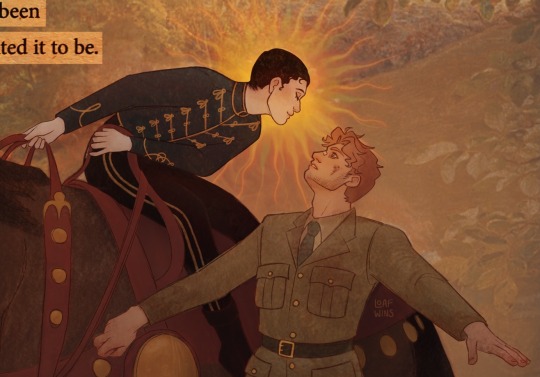
THIS ONE’S FOR YOU ELLWOOD!! 🔥🔥🔥 I KNOW YOU’RE A KEATS FAN!!!! 🗣️🗣️🗣️
Please reblog this I had to draw historically accurate military uniforms and I’m still not sure if this is the correct Light Brigade one 🐎
(A study of La Belle Dame Sans Merci)

#gauntwood#henry gaunt#sidney ellwood#in memoriam#in memoriam alice winn#in memoriam book#in memoriam novel#I COOKED WITH THIS#artwins
80 notes
·
View notes
Text
What we really need out of the 1990s American Girl doll, is a kid who’s obsessed with history because of American Girl
Her favorite doll is Felicity, and she volunteers at her local historical site. Her very own little 18th century dress for giving tours with her mom (made out of unadorned solid-color quilting cotton and not quite accurate in composition, naturally) is her prized possession. Of course the rest of her outfits are all over floral print, scrunchies, bell bottom jeans, etc.
We all know this to be true.
478 notes
·
View notes
Text
There is no canon indication that Belle is socially rejected for being smart
She IS smart, that's just not what the other people in town mention when talking about how weird she is.*
What seems to make the townsfolk uncomfortable, and what makes Belle feel superior the them, is that she's imaginative.
The opening song and its reprise have Belle singing about how she longs for the excitement of adventure and new experiences, which she can currently only get vicariously through books, and that she "wants much more than this provincial life", in a "little town full of little people" who are content to live out the same comfortable routines every day.
Meanwhile, everyone else is singing about how Belle spends so much time reading and daydreaming that she barely seems aware of the world around her, and doesn't show any interest in making friends. This is specifically stated to be unfortunate because Belle is so good-looking. Nobody expresses concern about Maurice lacking a social circle, just his hot daughter.
Fun fact, Gaston's concern that Belle's constant reading would lead to "getting ideas and thinking" (the main anti-intellectualism scene in the film) can also be interpreted to reflect an actual historical moral panic. There was a fear that the popularization of novels (particularly among women) would cause people to become delusional, unable to tell fiction from reality.
Hypothesis: most of the adults in town have been watching Belle ever since Maurice's 'harmless lunatic' reputation was established, wondering if she inherited her father's madness. Exactly none of her behaviour has reassured them, even before the thing with the Beast.
Gaston is either the one man unaware of this, being distracted by Belle's good looks (seen in how he talks over Lefou when Lefou expresses surprise and concern that Gaston is interested in Belle), and therefore does not consider how marrying a suspected madwoman might damage his own reputation; or he knows, but his ego is so solid that he assumes their marriage would not jeopardize his social position (heavily implied to be an accurate assessment, given the town's support when he sets up a whole wedding before even proposing to Belle, and the subsequent song to cheer him up after she turns him down).
*Note: in case it was unclear, this is about the 1991 animated version. The 2017 live action adaptation did have Belle facing social repercussions specifically for being educated.
83 notes
·
View notes
Text
Now I’m Covered In You [Chapter 5: Bells Each Hour]
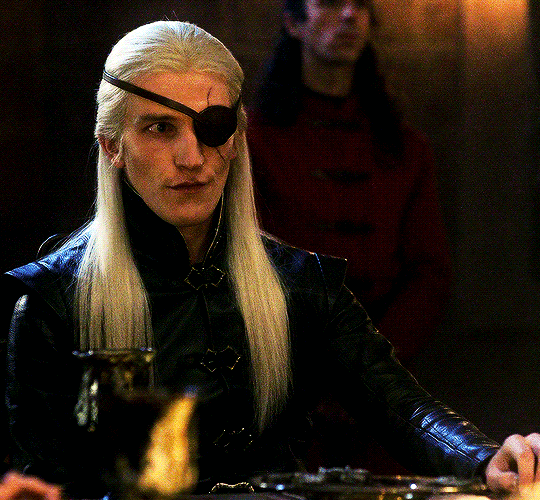
Series summary: Aemond is a prince of England. You are married to his brother. The Wars of the Roses are about to begin, and you have failed to fulfill your one crucial responsibility: to give the Greens a line of legitimate heirs. Will you survive the demands of your family back in Navarre, the schemes of the Duke of Hightower, the scandals of your dissolute husband, the growing animosity of Daemon Targaryen…and your own realization of a forbidden love?
Series title is a lyric from: Ivy by Taylor Swift.
Series warnings: Language, sexual content (18+), dubious consent, miscarriage, pregnancy, childbirth, violence, warfare, murder, alcoholism, sexism, infidelity, illness, death, only vaguely historically accurate, lots of horses!
Word count: 5.7k.
Link to chapter list (and all my writing): HERE.
Taglist: @borikenlove @myspotofcraziness @ipostwhatifeel @teenagecriminalmastermind @quartzs-posts @tclegane @poohxlove @narwhal-swimmingintheocean @chainsawsangel @itsabby15 @serrhaewin @padfooteyes @arcielee @travelingmypassion @what-is-originality @burningcoffeetimetravel @blackdreamspeaks @anditsmywholeheart @aemcndtargaryen @jvpit3rs @sarcastic-halfling-princess @flowerpotmage @ladylannisterxo @thelittleswanao3 @elsolario @tinykryptonitewerewolf @girlwith-thepearlearring @minttea07 @trifoliumviridi @deltamoon666 @mariahossain @darkenchantress @doingfondue @atherverybest @namelesslosers @skythighs
Let me know if you’d like to be added! 💜
You’re waiting for Aemond under the hundred-year-old cedar tree at the edge of the forest, Alonzo’s most recent letter in your hands. Midnight is grazing not far away, dewy April grass trampled flat beneath her hooves, silky black tail swishing. She won’t tolerate a lead chain, so she travels the woods unimpeded; but you know she won’t run. She never does. The slender pink ivory wood box is open on the ground, your sword propped against the tree trunk. Weeks ago, you carved four dates there in Roman numerals, infinitesimal inscriptions that you periodically trace back over so they never fade. They’re the days when you lost your children. You were permitted to keep no remnants of them, no stained cloths or recorded names. They belonged less to you than to the kingdom, and you were never allowed to forget this. All you have left are these shallow marks on a cedar tree as the world wakes up again: blossoms unraveling in the palace gardens, sprigs of jade-colored herbs piercing through cool rich earth.
Mother is possessed by conspiracies, Alonzo writes, forever a touch hyperbolic; you can picture his familiar wry smile as you drink up his words like roots swallow rain. He’s your oldest brother and thus the Crown Prince of Navarre. He’s been married for six years to Ippolita of Ferrara, three healthy children so far, one a boy named for your father. She swears there is something wrong with the water there, or the air, or the wheat, the culprit changes by the day. She frets, you know. As she always has. She wonders if we should dispatch one of our own bishops to bless you, or if you should undertake a pilgrimage to some holy site to beg the Virgin Mary for healing. More than anything, I think, she misses you. Her other daughters have found happiness in their marriages, and so it is easier for her to let them go and imagine it was for the best, but you…it is a different circumstance entirely, don’t you agree? Even Father has begun reassessing the illustrious English alliance he was once so proud of. He mutters that if you are to be childless either way, you might as well be home with your family, not trapped in some far-off, gloomy, turbulent land with a degenerate husband. We’ve heard things about Prince Aegon. Father says he never would have sent you across the Bay of Biscay if he knew what waited for you there.
I suppose what I’m trying to ask is…if the Pope would grant an annulment…if Father could work out an arrangement with King Viserys and the Duke of Hightower for you to come home again…would you want to?
All my love (and plenty more from Lita and the children),
Alonzo
You shred his letter so no one else will find it, looking up at a turquoise sky cluttered with fleecy white clouds, the same sky that stretches eastward to Navarre and beyond. You can’t go home; it would be a surrender, it would mean giving up any hope of a grander future. And it would mean giving up Aemond too. He’s not yours, but you can’t lose him. You feel like you can’t breathe every time you think of it. And there’s another reason why you can’t consider trying to dissolve your marriage. Not yet, anyway.
You rest your palms on your belly, vulnerable flesh beneath emerald-green silk, still at least a month away from starting to show. It’s early, very early, but by now you know the signs as well as the sounds of horses, the feel of the hilt of a sword in your grasp. It is your fifth attempt in less than two years. You have no reason to believe that this time will be different, that it will end in joy and triumph instead of ruin. Still, you suppose that anything is possible. It would be traitorous not to hope, wouldn’t it?
At last Aemond and Vhagar appear, galloping across the field to meet you at the edge of the forest. He’s in the saddle with his hair flying like a white banner, the buckles on his tunic glinting in the sun. You smile until he is close enough for you to read his face: tension, vexation, thinly-veiled ire. He dismounts in one fluid motion and Vhagar moseys away to graze beside Midnight, her enormous hooves clomping, dandelions and clovers leveled like fields at harvest.
“When were you going to tell me?” Aemond demands. He comes so close he fills your vision, your air; your lungs draw in smoke and leather, work and skill, every thread of muscle fought for. “After everything, I had to overhear it from the gossip of servants?”
Oh. Oh. “I hadn’t decided how yet. I was trying not to hurt you.”
“I’m hurt that you kept it from me.”
“Aemond…” You hesitate. There’s no delicate way to say this. “I didn’t want you to have to think about that part.” His brother on top of you, inside of you, melding with you to create a new heartbeat.
“I already think about it,” Aemond replies, sharp and stabbing like thorns. “I think about it all the goddamn time.”
Now your voice is bitter too. “Well, soon it will be my turn to be so afflicted, right?”
He quiets and retreats a few steps, rubbing his face with his hands. You try to remember if you’ve ever seen him do that before. He looks genuinely rattled, pained, remorseful. Kunigunde, the lone surviving daughter of Frederick III, will arrive in London any day now. Sometimes you find yourself wishing that her ship would sink to the bottom of the ocean or that some last-minute diplomatic squabble would go unresolved and she would be returned untouched to the Continent…but to what avail? Aemond will have to marry somebody. You cannot seem to produce a son, Nico won’t even be able to start trying until her wedding in August. The Greens need more heirs, more allies. And no ally could be more beneficial to their cause than the Holy Roman Empire. You should recognize the momentous advantage in this match. Instead, all you can think about is Aemond lying with another woman and memorizing the secrets of her body until they begin showing up in his poems, hips and wrists and the bumps of her spine.
“I’m sorry,” Aemond says gently. “I don’t want to argue with you. You’re not at fault for any of this. You’re not who I’m really mad at.”
“It’s alright. I understand.”
“How are you feeling?”
“Fine. A bit tired, a bit nauseous. Nothing new.”
“Good. But that’s not what I meant.”
You look at him as you stand in the shade together under the vast cedar tree. “I don’t feel anything,” you confess, words you could not share with anyone else. They would think you were in need of an elixir or a prayer or an exorcism. “I don’t feel happy, I don’t feel anxious, I don’t feel excited or afraid or hopeful. I want to be hopeful, it is my obligation to be hopeful, but I’m not. I don’t feel anything anymore. This has happened too many times already. Or maybe I’m just broken in spirit as well as in body.”
“You aren’t broken at all.”
You smile bleakly. “That’s kind, but I don’t think it’s true.”
“Believe me, I’d know. Brokenness and I are well-acquainted.”
And you wonder before you can stop yourself: What does he look like under his eyepatch? How exactly did it happen? Does it still pain him, does it enrage him? Does it make his hands ache for vengeance?
He asks: “What can I do?”
You get your sword from where it’s propped against the tree and twirl it once. “Distract me.”
“Gladly.” Aemond glides his blade out of its scabbard and lunges. You parry and strike him lightly across the back. Then you swiftly retreat, waiting for his riposte, on guard.
“I always wanted children, you know,” you say. “Not just because it was required of me. I grew up in a castle that was loud and full of footsteps. My mother was eternally playing with us, reading to us, tending to us. I imagined the same for myself. I craved it.”
“You’ll have children,” Aemond insists, forever so sure of something that feels impossible.
“You should have been the heir. Maybe this is how it happens. I’ll remain childless and Aegon will drink himself to death, and then you and your sons with Kunigunde will inherit the throne.”
He swings and you block, his blade clashing with yours once, twice, again, driving you backwards until you are pinned against the cedar tree. “I don’t want it that way,” Aemond pants from the effort, your swords locked together above your heads. “Not if it requires your sacrifice.”
You gaze up at him as his eye rakes over you; you’re close enough to kiss if you dared to. But you want much more than that. You want his long hair knotted in your fists, you want his hands on your bare skin, you want his tongue and his heat and his moans. But you have to be careful, so very careful. To be discovered sparring would be bad, but to be branded as adulterers would be far, far worse. For Aemond it would likely mean banishment. For you it would mean death by beheading or burning; only the king could commute the sentence. Rhaenyra would not persuade him to have mercy. And hers is the only voice you are confident Viserys would hear.
“Ivy,” Aemond whispers, a name that only he will ever call you. For a second, and only one, his palm skates weightlessly down your belly. You hear the distant chimes of the Tower of London, bells each hour, and it’s strange how so much time can pass without changing the heart at all. “I wish everything was different. I wish it was mine and you were too.”
And then he retreats in several long strides and waits for you to collect yourself so you can thrust at him with your blade again.
An hour later, Aemond helps you to rebury your sword—you’ve taken to keeping the pink ivory box in a shallow grave under the cedar tree so no one spies you ferrying it to and from Westminster Palace—and then accompanies you back inside once the horses are returned to the royal stables. He is mindful not to appear too familiar within sight of the court, but there are small gestures that he cannot seem to purge himself of: a hand on the curve of your back as you ascend stairs, shoulders and elbows that push others away if they inadvertently jostle you, glances to decipher the mood of your face. He signals to a servant and they scuttle over to bring you a cup of apple cider, cool and crisp and sweet.
“Where in God’s name have you been?!” the Duke of Hightower scolds you from across the hall, departing from a conversation with the Montford patriarchs. They wear serene, confident smiles. They’ve named Joanna’s white-haired bastard Aegon—not very subtle—and are basking in their recent procurement of titles, land, and influence. Already you’ve overheard the idea proposed, more than once and by various nobles: your marriage could be annulled, Joanna wed to Prince Aegon in your place, her son retroactively legitimized. The plan is certainly not without its own obstacles, but the Duke seems to be intrigued by it. Your husband will not entertain putting you aside. When the notion surfaces in his presence—like a shimmering fish from the depths of a pond—Aegon walks right out of the room.
You reply, with practiced innocence: “Just outside strolling through the gardens, Your Grace. The weather is lovely—”
“You shouldn’t be strolling anywhere. Not inside, not outside, not even to the chapel to beg God for the long-overdue deliverance of a son. You should be in bed.”
“Grandsire,” Aemond says. “Surely she cannot be expected to live as a prisoner.”
“She will live in whatever manner gives us the greatest chance of an heir. She may not be a prisoner, but she is a princess and a wife, and sometimes the requirements of these stations are not as divergent as you might believe.”
Aemond’s face goes dark, goes defiant. “You cannot put it all on her shoulders.”
The Duke of Hightower grins arrogantly; he’s caught him in the perfect trap. “But it’s not all on her, Prince Aemond. Within a week you’ll be sharing that burden. Making it lighter, even.”
Aemond glares at the Duke and says nothing.
“You will be married as soon as Kunigunde arrives. Within two days, mark my words. You’ll begin trying for a son in April, Nico in August. Now we have no heirs. But by this time next year we could have three! Isn’t that a happy thought?” And he marches away to resume his scheming, still smiling about it.
Aemond walks you to your rooms and stays there with you. You embroider pillows as he reads to you—a book about Aegon I’s Conquest in 1066—in a voice that is soft and low and secretive. Nico and Daeron join you both for dinner, and then you and Aemond are alone again. It’s wonderous and yet excruciatingly painful, profoundly unwise and yet necessary. You never speak of the night when he touched you beneath your nightgown, but it’s always there between you, a ghost that flutters curtains and creaks open doors trying to get your attention. You’re playing Tric-Trac on the bearskin rug, the fire dying down, when your husband reels drunkenly into your bedchamber.
“Aegon?” you say, startled. Aemond immediately moves away from you, at first just withdrawing to the other end of the rug and then rising to his feet as his brother continues to approach. You aren’t sure what he could want; it is recommended that pregnant women not lie with their husbands, and you’ll gladly take any excuse available to you. He must have forgotten at some point during his fifth, sixth, seventh, eighth cup of wine. “While I’m with child, I can’t—”
“I know, I know. I remember.” Aegon falls down onto the bearskin rug and slings his arms around your waist, burrowing into you. He rests his head on your chest, white-blond hair unruly and tangled. After a moment—long enough to recover from the shock of it—you hold him, tolerantly and sympathetically, like a wife should. Aemond leaves the room, river-blue eye downcast. Aegon doesn’t seem to notice. He sighs contently as you run your fingers through his hair, as your palms trace his back over his plain white shirt. There are red splotches on it, some of them wine, some blood; there are tacky streaks of it around his nose. He’s never done this before. He’s never sought you out for contact that was pure like this, without directives, without prizes to be won.
“Aegon?” you ask after a while.
“Yes, wife?”
“What exactly happened to Aemond’s eye?”
“My fault,” he murmurs drowsily. “He and I were supposed to be practicing our sword fighting with Sir Criston. Aemond was in the courtyard, exactly where he was supposed to be, and I was hiding in a stairwell somewhere guzzling wine, trying to forget who I was. Sir Criston went looking for me and while he was gone, they found Aemond. Jace, Luke, Baela, and Rhaena. Four against one. I don’t know much about math, but that doesn’t sound even to me. Aemond was a lot smaller then. He hadn’t gotten tough and mean yet. I’ve never been clear on who said what first, but eventually he was calling Rhaenyra’s sons bastards and they were calling him a worthless spare, unnecessary and unloved, at least in the king’s eyes. Neither of them were wrong, by the way. Aemond grabbed a rock. Luke had a knife. By the time Sir Criston returned with me in tow, it was over. I remember watching the physicians stitch up Aemond’s face, using tweezers and spoons to clean out the pieces of gelatinous flesh from his eye socket. Father did nothing about it. He cared more about Aemond calling Jace and Luke bastards than the fact that he was half-blinded for life. Aemond started wearing a sapphire in the socket once it finally healed. He still does, as far as I know, though I haven’t seen him without his eyepatch in years. It’s a reference to some folktale about a warrior with two sapphire eyes. Some metaphor I couldn’t appreciate. I think my tutors once tried to make me read that story and I never did.”
You are sickened by grief, revulsion, fury. He was just a boy. A boy who had been neglected and ignored and brutalized, and his own father couldn’t care less. A boy who learned to idolize fictional heroes in the absence of real ones. “Yes,” you reply weakly. “That sounds like something Aemond would do.”
“All my fault,” Aegon says again, clutching you tighter.
“I’m sure he knows you didn’t mean him any harm.”
“He’s disgusted by me. They all are. Because I’m not suited to be king and never will be.” His voice is clotted with wine, shame, self-loathing. “I never asked to be built of disappointments. I didn’t choose to be this way.”
“You’ll make a fine king, Aegon,” you tell him, because you’re supposed to.
“Do you think I’m the cause of our losses?” he asks suddenly, and you think: Our losses, not mine. He called them ours. “You conceive easily. I can have children with others. Neither of us seem to be defective in body. But perhaps I have inflicted great stress upon you with my indiscretions. My drinking, my sloth, my affairs. I did not think I was hurting you. I did not think of much beyond myself at all, to be perfectly honest. But it was horrible to see you that way. At Christmas. So bereft, so wounded. You’ve suffered so much here. You deserve the consolation that children would bring you.”
You comb your fingers through his hair, shorter than any other grown Targaryen’s; he doesn’t want their name, their legacy, their looming war. “I don’t think you had anything to do with the miscarriages. I think there’s something wrong with me.”
“I want to be better this time,” he says, peering hazily up at you and placing one hand protectively over your belly. “A better husband, a better man. For both of you.”
You wish you could feel relief, feel joy, even a whisper of it. Instead, all you can think about is Aemond: his face, his voice, his hands. If I have to watch him touch another woman, I’ll never be able to get it out of my mind. If I have to watch him fall in love with her, it will kill me.
“Maybe it would have been different if we had met somewhere else,” Aegon says dreamily.
“Where?”
“I don’t know. Somewhere very far away.”
His eyes dip shut and you stare into the dying embers of the fireplace: red like lust, like blood, like the flag of Navarre.
~~~~~~~~~~
It’s the next morning, and you’ve escaped as far as Nico’s rooms. She has what seems like hundreds of swatches of fabric strewn across a table, silk and velvet and linen.
“What do you think of this one?” she asks nervously, holding a scrap of butter-yellow silk to the bare skin of her upper chest. “It’s not really my best color. But the Duke of Hightower suggested I wear a yellow wedding dress. The flag of Milan has a great deal of yellow, you know. I don’t think he wants anyone to forget where I’m from. Or all the wealth and soldiers I’m bringing to his side.”
“How romantic,” you tease, smiling. “Doesn’t your flag also have a giant, murderous blue snake on it? Perhaps you could dress as one of those. We’ll sew you a nice long tail.”
Nico bursts out laughing, far too boisterously, as usual. “That would certainly get Daeron’s blood running hot, wouldn’t it?” Now she frowns down at the table fretfully. “I so want him to be pleased with me. I want him to remember how I looked that day for the rest of his life.”
How did you look on the day you married Aegon? Miserable, probably. Lonely. Empty. Nico will never have to feel that way. You’re happy for her; but it makes your own predicament louder somehow. “It’s your wedding day,” you tell her. “Wear what you like. What you feel most beautiful in. You can dress in yellow for Aemond’s wedding. The Emperor’s flag is yellow. I’m sure Kunigunde would appreciate that. You’ll make a marvelous first impression.”
“Brilliant!” Nico grins, assuaged. Then her eyes flick to the doorway. “Oh, hello there, Prince Aemond. Have you come to help with the wedding planning? We’re choosing flowers next.”
“I’m afraid I don’t have much acumen in that realm. But do let me know when you begin discussing cakes.” He stares at you expectedly, arms crossed, lurking like a shadow. There is a long, uncomfortable silence.
“Go on,” Nico prompts you, tittering anxiously. “We can continue this later. I’m supposed to be meeting Daeron for lunch soon anyway.”
You bid some goodbye to Nico that you’re barely aware of. Then you meet Aemond in the doorway, feeling very much like someone caught in a mistake, a lie, a trap. He turns away without a word and you follow him through the winding halls, colored by aisles of midday light and the tolling of distant bells. “Aemond…?”
“I’m thrilled to hear how well you’re getting along with your husband. He stayed all night, from what I gather. The servants are buzzing with it. The Montfords are licking their wounds.”
“Are you delusional enough to believe that I have any say at all in where he spends his time—?”
“I saw you,” Aemond snaps viciously. “You weren’t just being civil. You comforted him, you had your hands all over him—”
You grab Aemond by the front of his tunic and yank him in close so you can hiss: “And where are your hands going to be once you marry the Holy Roman Emperor’s daughter? I have a few ideas. Would you like to confirm them? And things besides your hands as well, I imagine.”
“You’re unbelievable,” he flings, ripping away from you. You dash after him through empty hallways; he’s headed to your rooms, to a place where you will have relative privacy.
“What do you want from me?!” you whisper fiercely, burying it in him like a knife. “You expect me to sabotage my entire life, to reject my husband and neglect my responsibilities so that you never have to be inconvenienced, so that you never have to experience any pain—!”
“Pain?! That’s a kind word for it, it’s agony, it’s fucking impossible—”
Aemond throws open the door to your rooms. Inside, a servant is fixing you a cup of apple cider…and sprinkling the contents of a tiny silk pouch into it. When he sees you and Aemond, he shoves the pouch into his shirt and scurries away.
“Wait!” Aemond commands. The servant starts sprinting. “Don’t drink that,” Aemond tells you, pointing at the cup, then takes off after the servant. He catches him in your bedchamber, hurls him against a wall, and snatches the pouch from inside his shirt. “What the hell is this?”
“Nothing, Your Royal Highness. Just spices from the kitchen.” But his words spill out in a stammer and sweat pours from his reddening face.
Keeping the servant pinned to the wall with one hand, Aemond pitches the silk pouch to you. A servant shouldn’t have anything silk at all; it’s too expensive, too rare. “Do you recognize that?” he asks you.
Inside is a fine, powdery dust of a dried herb, dotted with shriveled purple blossoms. It smells vaguely of mint. “I don’t.”
Aemond drags the servant out of your rooms and into the hallways. The man is openly struggling now, mewing and slapping at his jailer’s face and hands. Aemond takes no notice of this. He is calling for guards, for physicians. A pack of inquiring spectators materialize around him: Nico, Daeron, Alicent, Sir Criston Cole, many other supporters of the Greens. Aemond does not stop until he reaches the Great Hall, where King Viserys is holding an audience with Rhaenyra, Daemon, and their children, bouncing little Visenya on his knee as she giggles. The violins screech to a halt when you and Aemond enter the room. He throws the servant violently to the floor.
“Good afternoon, Aemond,” the king says with moderate interest, still looking at Visenya.
The Duke of Hightower storms into the Great Hall. “What is going on in here?!” His steely eyes flit from Aemond to the servant sprawled on the floor to the king, back to Aemond. “What’s happened?”
“This man was putting something in the princess’s cider. An herb of some sort. I want it identified.”
“An herb?” King Viserys says blandly. “Have you asked the servant himself? Surely there is a logical explanation—”
“I want it identified,” Aemond repeats. “Now.”
There is chatter from the observers, which is exactly what Aemond needs. They serve as witnesses, as assurance that his accusations will be heard. You wonder where Aegon is; drunk and oblivious somewhere, probably.
“Very well,” the king relents, and waves to a guard. “Fetch a physician.” Then he barks at the crowd: “Out, vultures! All of you! Everyone except family!” The Green-affiliated courtiers reluctantly disperse; Nico goes to leave with them, but Daeron grasps her hand. Alicent clings to Sir Criston. Rhaenyra has Visenya, Viserys II, Aegon III, and Joffrey taken back to the nursery.
The Duke of Hightower glowers at the silk pouch. “Let me see.” You give it to him, and he opens it and sniffs. His forehead crinkles. “I can’t discern this.”
Daemon drifts close to you, clipping by like a comet. “Do you think wearing Green all the time now will miraculously make you one of them? Not until you’ve paid your debts, I think. And women have been known to die in childbirth. Just ask our dear Alicent over there. She owes all her…” His mouth twists cruelly around the word. “Fortune to the late Queen Aemma.”
“It is so wise of you to always dress for a funeral, Prince Daemon,” you say. “You’ll be prepared for your own when it imminently arrives.”
Daemon’s grin doesn’t disappear, but it turns harder, more jagged.
“This is terribly overblown, I’m sure,” the king says, then pauses to cough into his sleeve. He’s been nursing the same chill since January, one that ebbs and flows but never dies. “It’s all just a misunderstanding…”
Queen Alicent gestures to the pouch. “Might I see that, Father?” The Duke passes it to her. She opens the pouch and shakes some of its contents into her cupped palm.
“This is utter paranoia,” Rhaenyra complains, keeping Jace and Luke close to her; but she steals an uneasy glimpse of Daemon.
“They’re always so eager to cast themselves as victims, aren’t they, Mother?” Jace says.
Daeron shouts back: “And you’re always eager to cast yourselves as people who would happily stab someone’s eye out!”
“He slandered us!” Jace cries. “It was self-defense!”
“It was inches away from being murder!”
“And isn’t that the proper punishment for treason?” Baela says smugly. “To lose one’s life?”
“You’re about to lose your fucking life!” Daeron dives for her. Baela howls and scratches at him as Sir Criston leaps in to try to untangle them. Daemon grabs Daeron by the throat and lifts him off the ground; Daeron’s feet kick wildly, his face turning blue. Sir Criston draws his sword. Nico races into the melee, slamming both palms into Daemon’s chest with such force that she stuns him enough to drop Daeron, who falls gasping to the floor. Sir Criston drags him to safety. People are yelling, launching accusations and swears. The king is doubled over hacking.
“You bitch,” Daemon growls at Nico, and rips his sword from its scabbard as he towers over her.
Without thinking, you rush to defend Nico. Aemond’s arms close around you and pull you back. He murmurs through your hair as you battle him: “No, no, no, no.” And then you remember. The baby. I can’t do anything to hurt the baby. And you feel a sudden, overwhelming longing to protect this life, to meet this child, an attachment you didn’t think you were capable of experiencing again.
“I know what this is,” Alicent says softly, and everyone quiets and turns to her. Her face is dazed, appalled. Her hand holding the crumble of dried herbs is trembling. “It’s pennyroyal.”
No one moves, no one speaks. The silence is deafening. And it’s no wonder why none of the men could identify it in its medicinal state, why you couldn’t. You’ve never had need of a plant known to encourage a woman’s monthly blood. Since you’ve arrived in England, you’ve bled far too much. All those months of longing, hope, loss. All those taunts and whispers and rebukes and pieces of fruitless advice.
When the words finally tumble from your lips, they are faint and very small, almost childlike. “It wasn’t my fault?”
Aemond releases you and tears his sword free, holding it to the petrified servant’s throat. “I want him dead,” Aemond seethes, wrath like wildfire, like Plague. “I want him drawn and quartered, I want him awake when they disembowel him, I want him to feel everything. But first I want him racked until he reveals who paid him to commit this barbarism. I want to listen as his bones rip from their sockets.” He turns to Daemon, his blue eye blazing, manic. “And I suspect I know whose name he’ll scream at the end.”
“This is a baseless accusation!” Daemon snarls derisively.
“Dear God,” the Duke of Hightower says, gazing at you in guilt-laden horror. His hands come up to cover his gaping mouth.
“Do you have any proof that Daemon is responsible?” the king asks Aemond.
“Viserys,” the Duke says incredulously. “Prince Daemon has threatened her more times than I could ever count, he has incessantly abused and provoked her, he is her most notorious enemy—”
“There’s no proof,” Rhaenyra says, looking to the king. “You hear them, don’t you, Father? They have insults but no proof. They mean to use this treachery as an opportunity to destroy us.”
“He’s been paid by someone!” Aemond explodes, jabbing the tip of his blade against the whimpering man’s throat until he bleeds. “He’s been recruited! Why would a servant take it upon himself to poison a princess, to risk his livelihood, his life? Why would he have a pouch made of silk to carry his lethal herbs around in? He’s been roped into a conspiracy, and who else would have cause to murder her children in the womb, who else would dare?!”
“There’s no proof,” Daemon says again, and they all join him in a chorus, Rhaenyra, Jace, Luke, Baela, Rhaena: no proof, no proof, no proof.
The king shakes his head at Aemond. “Your lifelong hatred for Rhaenyra’s branch of the family has blinded you—”
“They could have killed her!” Aemond thunders, and there are tears of raw fury gleaming in his eyes. “Don’t you understand?! It wasn’t just the pregnancies, she could have hemorrhaged, she could have died, they risked her life to try to keep Aegon from the throne—”
“The throne will never be Aegon’s.”
“God Almighty, Viserys, that’s not the point,” the Duke says. “If this is true…it would be a most unforgiveable sin. It would be treason. It must be investigated.”
“I simply cannot see any proof being offered here.” The king dissolves into another coughing fit.
“You had no wrath when my eye was taken from me, Father,” Aemond says. “You felt no obligation to protect your son or your wife from the bloody consequences of Rhaenyra’s pride. All those years ago you let her believe she was invincible and now we are all forced to reap the aftermath. Surely you must feel outrage for the grandchildren this has cost you, for the inhuman crimes committed against the princess. She is your family, Father. Aegon is your family. I am your family. Don’t you recognize us at all?”
Daemon stalks towards him like a wolf, each step slow and calculated. “She’s your brother’s wife, Aemond. Not yours.”
“I haven’t forgotten.”
“Oh, haven’t you?” A hellish grin lights up Daemon’s face like the red flush of fever. “Tell me, how did it feel lying awake all those nights, staring up at the ceiling in your cold, lonely bed, knowing that your worthless brother was sinking himself into her again, and again, and again, and all that time he didn’t…even…appreciate it?”
Something breaks in Aemond, something cracks his atmosphere in two like lightning. He lunges at Daemon with his sword, roaring, swinging, stabbing. Their blades clang over and over again, shrieks of metal that echo through the Great Hall. The Duke of Hightower is bellowing, and Rhaenyra is screaming, and Alicent and Nico and all the children are too, everyone understanding that this could just as easily kill one as the other; Sir Criston is trying to help Aemond beat back Daemon, but the blows are so ferocious and swift that he has trouble keeping up with them. The Duke shouts for the guards and they flood in, a dozen men in full armor at last separating the two warriors like continents splitting apart. The king is rasping as he struggles to catch his breath. You are the only one who doesn’t make a sound. In your skull circles the same refrain like the ring of a full moon, like the cyclic chiming of bells: They did this to me. They did this to me. They did this to me.
In the midst of the chaos, the king lurches off his throne and collapses to the floor. Blacks and Greens alike descend upon him. Daemon cradles him in his arms, Alicent is sobbing, the Duke of Hightower is feeling the temperature of the king’s face and neck, Daeron is franticly trying to rouse him.
And even as he plummets into unconsciousness from which he will never recover, the king reaches only for Rhaenyra.
#aemond x you#aemond x y/n#aemond targaryen x reader#aemond one eye#aemond targaryen#aemond targaryen x you#aemond x reader
290 notes
·
View notes